Friends of Croatia: Croatian Protocol Guide - Diplomatic Arrivals and Departures
June 23, 2021 - The ninth article in the series, "Friends of Croatia: Croatian Protocol Guide", brings you more details from the Protocol guide for diplomatic missions accredited to the Republic of Croatia issued by the Ministry of Foreign and European Affairs to ease the arrival of the foreign diplomatic representatives to Croatia.
With diplomatic immunity already being mentioned in this series, we saw that the Croatian Ministry of Foreign and European Affairs (MVEP) following the terms of the 1961 Vienna Convention on Diplomatic Relations, dedicated a special part to diplomatic immunity in its Protocol guide for diplomatic missions accredited to the Republic of Croatia. This guide is another confirmation of how MVEP, as it previously explained to TCN, finds diplomatic relations very important, particularly representing the interests of Croatian companies and the Croatian economy, which back in March was evident in a successful agreements FM Gordan Grlić Radman achieved for Croatian entrepreneurs on the Egyptian market.
„In a constant effort to provide, in a timely fashion, quality support to diplomatic missions, diplomats, and other members of missions, the Diplomatic Protocol is happy to present a brief guide for diplomatic missions with useful guidelines concerning ceremonies and visits, and privileges and immunities. The guide is meant for information purposes only, and we hope it will help diplomatic missions and their members enjoy successful terms in office in Croatia“, says the opening of the Protocol guide. Guide also points out how „The Diplomatic Protocol of the Ministry of Foreign and European Affairs is the principal address for diplomatic missions accredited to Croatia“.
Apart from previously mentioned diplomatic immunity, the guide also explains the details of welcoming new diplomats as well as the procedure of escorting the diplomats on their departure from Croatia.

Pixabay
Ground/air arrivals
So, when the Ambassador arrives in Croatia, the Diplomatic Protocol, Ceremonies, and Visits Department informs the competent authorities. What is interesting is that the rules in the protocol differ in practice pending how Ambassador comes to the country.
„If the Ambassador arrives by a road border crossing, then the head of the Ceremonies and Visits Department will schedule the earliest convenient date for a visit to the newly appointed Ambassador at the official residence or the Embassy of the sending state“, explains the guide.
The other option is by airplane.
„When the newly appointed Ambassador enters the state territory of the Republic of Croatia for the first time at a border crossing at the Zagreb International Airport, his/her VIP treatment will have been arranged and, during office hours, he/she will be greeted by the head or a representative of the Ceremonies and Visits Department“, says the guide.
The Embassy also sends a diplomatic note to the Diplomatic Protocol to arrange details and date regarding the presentation of credentials to the President of the Republic of Croatia and of copies of the credentials to the Head of the Diplomatic Protocol of the Ministry of Foreign and European Affairs of the Republic of Croatia. This is important as it confirms the Ambassador is not just a visitor but a legitimate representer of his/her country and appointed by the authorities of the country that enjoys bilateral relations with Croatia. And proper goodbyes at the end of the Ambassador term are in order as well.
„When an Ambassador is to depart from the Republic of Croatia, his/her Embassy will send a note to the Diplomatic Protocol advising of the date and time of his/her departure. The Ceremonies and Visits Department then notifies the competent authorities of the time and place of his/her departure from the state territory of the Republic of Croatia. VIP treatment at Zagreb International Airport will be arranged“, explains the guide.

pixabay
Friendly and safely
As foreign ministers frequently travel to other countries, embassies have a key role in making those visits.
„An Embassy in the Republic of Croatia notifies the Diplomatic Protocol in a diplomatic note of the visit of a Minister of Foreign Affairs to the Republic of Croatia. All further details concerning the visit are conveyed to the Diplomatic Protocol in a diplomatic note. In the case of an official or working visit, the Ceremonies and Visits Department is responsible for the logistic support. The Ceremonies and Visits Department will in further communication with the Embassy in the Republic of Croatia arrange the details of the organization of the meetings requested. This includes accommodation in the previously agreed format, transport, protocol and security. At the proposal of the Ceremonies and Visits Department, or at the request of the Embassy, free time will be organized as well. If the proposal is accepted, the Ministry of Foreign and European Affairs will cover the expenses of the proposed part of the program“, explains the guide.
There is even an interesting prescription regarding the safety of politicians visiting the country. As the guide points out, the arrival of a protected person, delegation and security staff needs to be announced at least 48 hours prior to entering the territory of the Republic of Croatia. Pending on the rating of the protected person varies the allotment of firepower allowed to be carried in Croatia by the security staff. Three pieces of firearms along with ammunition for the Head of State, 2 pieces of firearms for a Parliament Speaker or a Prime Minister, and one piece of a firearm for the Minister of Foreign Affairs or a Head of an International Organization and Institution. Of course, this norm can be changed pending „on the basis of the judgment of the security department in charge, or on the basis of reciprocity“.
„When announcing the arrival of a protected person, delegation and security staff, a detailed program of activities needs to be submitted“, informs the guide.
Info such as times of arrival in and departure from the Republic of Croatia, the border crossing to be used for entering and exiting the state territory of the Republic of Croatia, personal information including passport numbers of nationals of non-member states, ID numbers for citizens of EU Member States as well as brand, type and a serial number of firearms and quantity of ammunition that foreign security staff will be bringing into the Republic of Croatia must be provided in the program of activities.
It may sound a bit strict but easily manageable by professionals in a friendly bilateral relationship, allowing to conduct diplomatic relations without fuss. One such important recent visit to Croatia came from the US Department of Homeland Security Officials in Croatia regarding visa-free travel. No doubt, these established rules were vital for that visit as for many others to come in the future as Croatia continues to nourish diplomatic ties with its allies.
To read more from the series "Friends of Croatia", follow TCN's dedicated page.
For more about diplomacy in Croatia, follow TCN's dedicated page.
Friends of Croatia: Japanese Embassy - Friendly Relations between Croatia and Japan
June 17, 2021 -The eighth article in the series, "Friends of Croatia: Japanese Embassy", saw TCN reporter Ivor Kruljac sit down with Japanese Ambassador Misako Kaji and discuss all things regarding diplomatic relations between Japan and Croatia. Overall, Croatia and Japan are friendly countries with many shared values. With Croats and their expertise in improvisation and the excellent crisis response of the Japanese, the two countries can benefit greatly by learning from each other.
Croatia and Japan officially established diplomatic relations on March the 5th, 1993.
I was nervous while the taxi drove me to the Ambassador's residence. Japan is known for punctuality, and I worried whether or not I'd manage to make it on time as my cab was trying to break through Zagreb's midday rush. But in the end, I managed to arrive ahead of schedule. It was great that I wasn't late, but that's still clearly a very far cry from the punctuality of a country where a train conductor apologised when the train left the station 25 seconds ahead of schedule.
As I was rewinding the questions I had prepared in my head, I thought about greeting my interlocutor-to-be. Handshakes are a bit of a risky thing due to the coronavirus pandemic, but even if that annoying virus was somehow erased from existence, in Japanese culture, people would still greet each other by bowing. Do I need to bow, or does the Ambassador need to follow the Croatian culture of handshaking (or perhaps bumping fists in these pandemic-dominated times)?
Cultural Attache, Yutaro Nishida welcomed me to the premises, and at last, introduced me to the Japanese Ambassador Misako Kaji, who welcomed me with a smile, respect, and kindness. The debate on whether to bow or fist-bump was resolved by doing both, with both sides respecting and accepting each-others cultural background. For safety, I kept my mask on while the Ambassador removed hers so that her voice could be more clear as the interview was recorded. I moved my mask only occasionally to drink the amazing traditional green tea that was served during the interview, which was paired well with a warm and friendly atmosphere from the official representative of Japan in Croatia.
Misako Kaji graduated with a BA in the economy at the University of Tokyo, followed by an MA in philosophy, politics, and economy at no less than Oxford University. Inside the Japanese Ministry of Foreign Affairs, she served in the Japanese Embassies in the UK and Vietnam, but also in Japanese EU and UN missions. As an Ambassador and deputy of the main representative, Kaji also served in Japan's Delegation to international organisations in Geneva. In Japan, she was the deputy spokesperson for the Japanese Prime Minister and was a professor at the Tokyo and Hitotsubashi Universities. Ambassador Kaji also has quite some experience with the United Nations (UN). She was a special advisor of the high committee of the UN Refugee Agency (UNHCR) as well as a member of the UN Advisory Committee on Administrative and Budgetary Questions and a member of the advisory committee of the UN Peacebuilding Fund. She has represented Japan in Croatia since May 2019. Two years and twenty days, as she stated on the day of the interview that occurred last Friday.
Japanese culture is beloved in Croatia
''If you'd asked me a year ago, I would've said the Adriatic sea, the scenery, and the colour blue, all of these wonderful UNESCO heritage sites and nice people ready to help when you're travelling,'' started Ambassador Kaji, explaining what she had found most interesting and impressive in Croatia.
''But, after two years, I have something more to say, and what I like about Croatia is the 'Japan' I encounter in Croatia, and that is a very positive discovery. I didn't realise Japanese culture was so widely embodied in a variety of Croatian minds,'' noted ambassador Kaji.
The most recent instance was last week's handover ceremony of the Foreign Minister's Commendation to the Croatian Origami Society, which took place at the Ambassador's residence. Some of the members have been engaged with this artistic papercraft (taught in Japanese kindergarten) for over 20 years now.
''They are very much interested and dedicated without being imposed or forced to be, and its members included chemistry students, medical doctors, and even an 11-year-old boy. There were so many different categories of profession, and some even folded Origami while on probation, and that is where they'd encountered the art of origami,'' continued the Ambassador, fascinated with such love for one of the essentials of Japanese culture, keeping hold of plenty of works donated by participants of the ceremony.
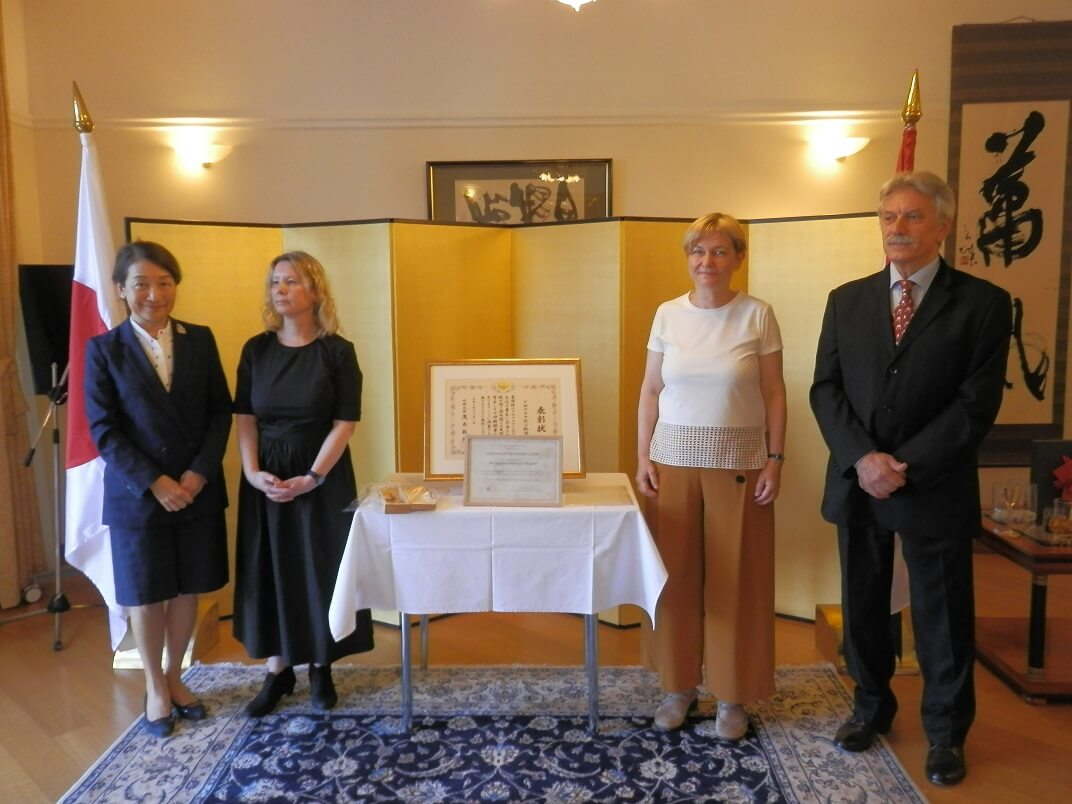
The handover ceremony of the Foreign Minister's Commendation to the Croatian Origami Society, June 2021 © Japanese Embassy Croatia
She is also particularly delighted with Biograd na Moru, a Croatian city in the Zadar area that not only commemorates the Atom Bomb falling on Hiroshima and Nagasaki but also has a metal crane bird as a monument to this dreadful tragedy that occurred on August the 6th, 1945.
''There is a legend that cranes live for a thousand years, so they are often used as presents for somebody who has been met with disasters or illness. In Hiroshima, they have a thousand cranes (made in the origami technique) folded and presented for the wish of peace,'' explained the Ambassador. Such a ceremony was also seen in Biograd na Moru, initiated by mayor Ivan Knez with a large metal crane made to outlast paper for generations to come.
The Japanese martial art of Karate is also popular in Croatia with some quite good successes achieved by Croatian athletes. Last month, the European Karate Championships were held in Poreč, where Ambassador Kaji was invited and was again fascinated with the use of the Japanese language and overall traditions despite there not having been a single Japanese athlete present there.
With so much of Japanese culture being present here in Croatia, it's difficult to say what the most beloved aspect of Japanese culture is for the Croats.
Before the pandemic struck, Ambassador Kaji remembered the Japan Day event in Zagreb's popular Mimara Museum, which saw huge attendance and a presentation on Japanese food, sake (Japanese rice schnapps) degustation, Ikebana (flower art), a tea ceremony, bonsai (aesthetical horticultural shaping of small trees), martial arts such as Karate, Judo, Kendo, haiku poetry workshops, calligraphy, Igo chess and much more.
2019 was also a big year for a Japanese promotion with the 2020 Olympic Games, which saw Croatian athletes from the 1964 Olympics attend the promotion for 2020. Additionally, for Japan, as Ambassador Kaji pointed out, the Paralympic Games are an important measure for the general success of the Olympics, which was evident in the ParaBOX installation (where visitors were challenged to find a ball in complete darkness), and the presentation of the Japanese car company Toyota's car which is designed to be able to be driven by people with disabilities.
However, when it comes to younger people, particularly students of Japanology (which Croats can study at either Zagreb or Pula University), one cultural trend emerged.
''The Japanese language is very tricky to learn, so I asked one graduate student how she first encountered Japan and heard the language, and it was anime,'' Ambassador Kaji recalled. She added that the Japanese cartoon art of anime became pretty universal and is no longer limited only to Japan. (The same goes for Japanese comics such as manga, with both of these pieces of pop culture being incredibly diverse in genres and having something for everyone, covering all social groups and even not avoiding vivid graphic images of violence and/or sex).
''At the Foreign Ministry of Japan, we have an award from a world competition because of the promotion of manga, but without trying to focus or push deliberate energy into that promotion,'' stated Ambassador Kaji.
As Japanese pop culture, anime and manga are indeed very popular here in Croatia, which is visible at the Pandakon conference that is held annually at Zagreb's Močvara club. Fans often dress up as their favourite characters, and there are often rewards for the best cosplay.
However, there are also heated debates between fans and people in the manga/anime industry that also affect Croats. On the one hand, representatives of the anime and manga industry are unhappy with cosplay, viewing it as a copyright infringement and believing that fans should be paying for cosplaying these characters. On the other hand, fans say they are just trying to show love and appreciation for their work, and they are also promoting and attract new audiences. It's indeed true that someone might not know what is ''Deadman Wonderland'', but upon seeing a brilliantly crafted cosplay of Shiro, they may ask the cosplayer about the character and then watch anime or read manga.
Ambassador Kaji says the Japanese Government is aware of the problem.
''Earlier in January, the Minister for the "Cool Japan“ Strategy (with Cool Japan being a brand strategy, aiming to disseminate Japan's attractiveness and as a unique culture throughout the world), Shinji Inoue said that he was aware of an opinion among the cosplay community rising, and this could be a real legal problem. It was important to secure an environment in which people can enjoy cosplay at ease, without worrying about possibly breaching laws. So, the Minister declared that he would come up with ways to deal with it but has not yet specified what those ways will be,'' explained the Ambassador.
Friendly Nations: sharing values, but trade could be better...
The cosplay question is one of the political issues in Japan, but when it comes to politics, what exactly is going on between Croatia and Japan?
''We're friendly countries; we share the same values. Unfortunately, you can't speak your own mind in every country, but Croatia and Japan belong to those countries where you're free to have as many children as you want, free to say what you like, free to travel where you want, free to choose your own vocation. In other words, we're both free countries that share the same values, democracy, human rights, and rule of law,'' said Ambassador Kaji, adding there are occasional disagreements, but that is normal and nothing to worry about.
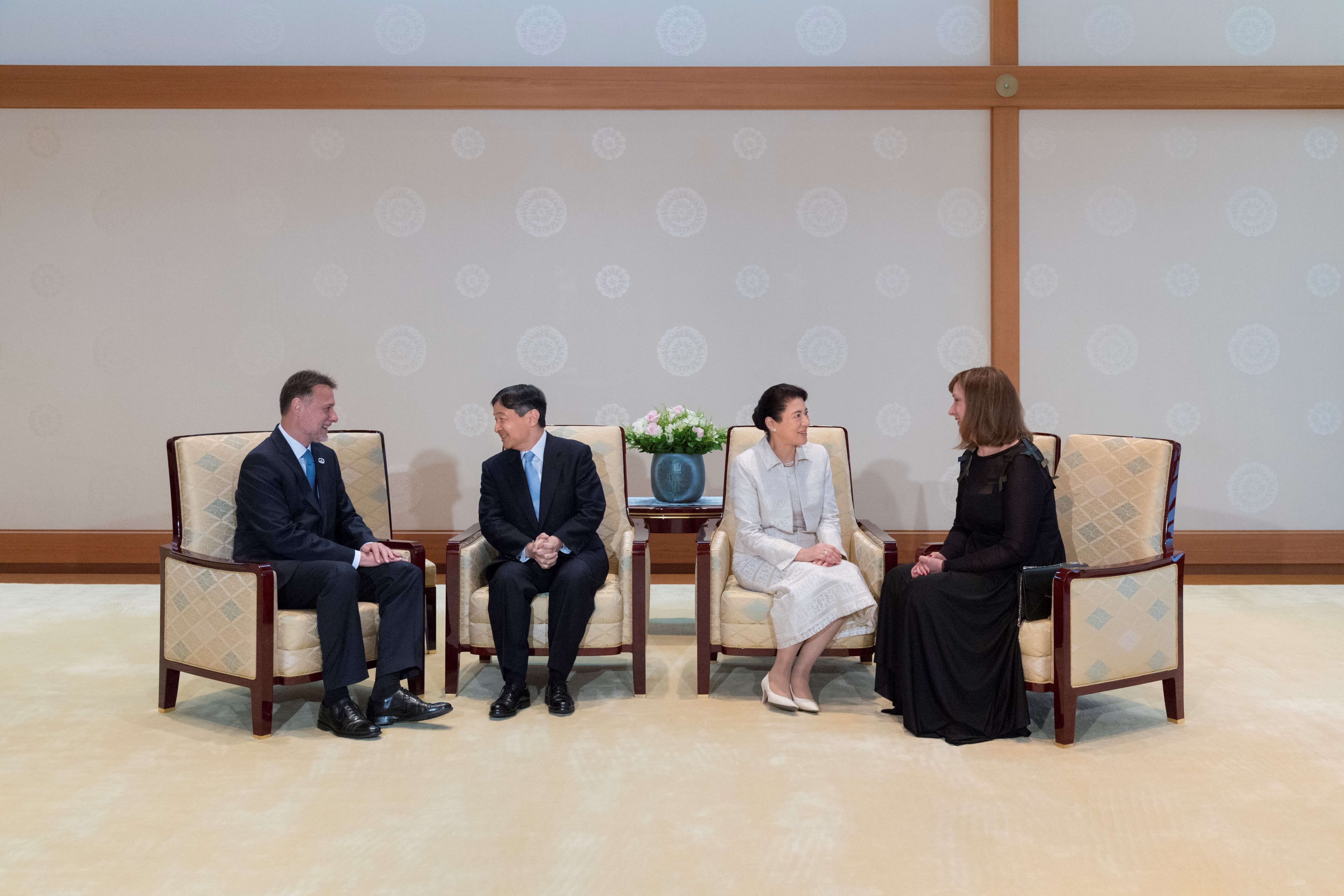
The Emperor and Empress of Japan grant an audience to the Speaker of the Croatian Parliament Gordan Jandroković and Mrs Jandroković during their visit to Japan upon the invitation of Speaker Oshima of the Japanese House of Representatives, June 2019 © The Imperial Household Agency
Kaji also pointed out that Croatia is pretty prevalent in Japan thanks to its sporting heroes. ''Everybody knows who Modrić and Čilić are; Croats are disproportionately present in world sport,'' she said.
Ambassador Kaji also rates Croatian EU membership as a great advantage.
''Through the EU, you're very well represented. When Croatia held the European Council Presidency during the first half of 2020, one of the most important parts of Croatian foreign policy concerned the Western Balkans and you advocated the EU's perspective for them as we don't want to roll back into a conflict or the changing of the borders after such a great sacrifice,'' Ambassador Kaji stated, referring to the war back in the '90s.
An important instance of that is the Zagreb Declaration from June the 22nd, 2020.
''We're part of the group that supports the European idea, and through that, the Croatian idea, as we share the same values,'' confirmed the Ambassador.
She added that while it may seem far away, the issues of the Balkans are relevant to such ideas like the Free and Open Indo-Pacific, and advocating the peace and freedom of nagivation, for example, is required on both locations, and Japan sees Croatia as a partner in that regard.
Ambassador Kaji also regularly contacts the Croatian Ministry of Foreign and European Affairs (MVEP), the Government, Parliament, the President's office, various cultural institutions, sports institutions such as the Croatian Judo Federation, the Croatian Karate Union, and the Croatian Olympic and Paralympic Committees, educational institutions, local government units and more. She also works on maintaining friendly ties with other ambassadors and diplomats in Croatia.
''My diplomatic colleagues know that only those who are blessed get to be stationed in Croatia,'' revealed Ambassador Kaji, not hiding her happiness for representing Japan in this Southeastern European country.
She is also particularly excited about going to Virovitica this week since she has never been. The visit is to attend the exhibition on Japanese pottery titled ''Yakishime: Earth Metamorphosis'' which is coming to Virovitica after already having been held in Vukovar and Pula.
Commenting on the most frequent contact she keeps in Croatia, she said that it's very hard to say, but statistically, maybe the Japanese Embassy communicates the most with MVEP. ''We're only two minutes away from the Ministry,'' said Ambassador Kaji.
Of course, not everything can be equally balanced and trade is unfortunately currently sitting on pretty low branches of the overall tree.
''When it comes to trade, we made up only 0.28% of Croatia's exports with tuna being a major portion - which is nice. In addition, when it comes to investments in Croatia, only 0.5% of all investments come from Japan. So there's room for improvement there,'' stated Ambassador Kaji with optimism.
Some of the instances of trading and business between the two countries can be seen in the Japan-based company Nipro taking over Piramida, a Croatian pharmaceutical packaging producer from Sesvete near the City of Zagreb last month.
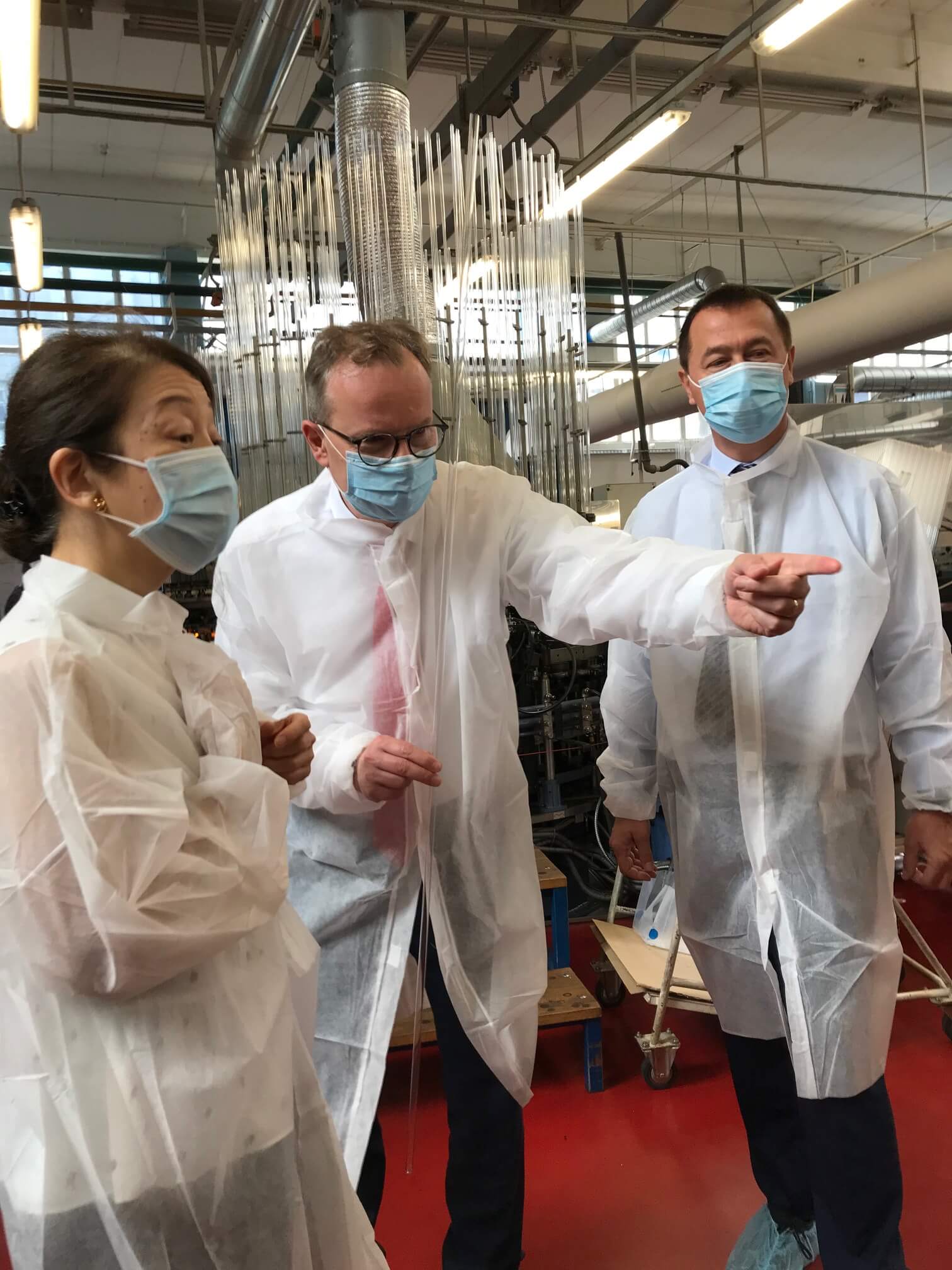
A visit to Nipro PharmaPackaging Croatia, June 2021 © Japanese Embassy Croatia
Knowledge – the way forward while not forgetting culture or tradition
As mentioned, Japanese culture is widely popular and much loved among Croats, the Japanese love Croatian athletes, and the two countries share friendly relations. Both Croatia and Japan have their traditions and cultural heritage. With ever-present technological development, some people in Croatia do fear that progress will lead to Croats forgetting their traditions, ways, and cultural heritage. On the other hand, Japan has seen huge technological development evident in very fast internet, modern trains, robotics, and more. Yet, their tradition and culture remain well preserved. What's the secret, and how can technological advancement be balanced with keeping a focus on tradition?
As Ambassador Kaji explained, the gist is to ''keep your spirit, but introduce technology''. While the Ambassador believes that the path of economic development makes sense in the long term, it wasn't always so easy. In the past, economic development was accompanied by pollution, and Japanese people, apart from developing health issues, entered an atmosphere that wasn't very kind to their traditional ways. But things have improved since then.
''In the 21st century, people and governments are more focused on green technologies and digital technologies which can be friendly towards and resonate with keeping up with traditions. Like when drinking tea, you have a ceremony, but the leaves for the green tea need to be carefully nourished in a kind environment, so that isn't very compatible with mass production or polluted air. But when, for example, you use the wind to produce energy, that's a nice eco-friendly way that co-exists with traditional culture,'' explained Ambassador Kaji.
She added that this way of co-existing then becomes mutually supportive and crafted to be resilient and long-lasting. That being said, new technologies also need to be carefully crafted to keep an eye on traditions, and improvisation is troubling in that regard.
''If you show respect for tradition, and you use academic knowledge or research, then there must be a way of remaining aligned with tradition and pursuing technology to have them both be mutually supportive,'' concluded Ambassador Kaji, and her belief about Croatia's technological development is that it will not be fatal to Croatian tradition.
Speaking of tradition, traditions form habits that then become accepted in various societies. With the already mentioned Japanese love for punctuality and the general perception of the Japanese as organised people that like order and plans, the perception of Croats can be quite the opposite. Many see Croats as laid back and relaxed, not making a fuss if they are a bit late. However, Ambassador Kaji sees a different picture of the Croats from her experience, particularly when it comes to Croatian women.
''A cleaning lady from Slavonia that comes to clean my office every day just starts working and cleans meticulously. She doesn't leave one small thing out and she is very responsible. In Japan, you don't see so many women gardening, and here, the women that watch over my garden are very powerful and professional, and that is very impressive,'' she noted. The work ethic and responsibility are something she sees with all of the Croats working for her.
''When it comes to Japan, we plan for perfection, so the dark side of that characteristics is, for instance, being late with the vaccination rollout. There are all sorts of verifications that take place there, making sure everyone can get them, and yes, they're proven safe abroad, but we had our own evaluations done, and that was the main reason we've been criticised for being too slow. Here in Croatia, you're really good at improvising. We can learn from each other,'' Ambassador Kaji said, sharing her observations on the habits of Croats and people in Japan.
She added that one such thing where Croatia can learn from Japan is crisis response, particularly when it comes to earthquakes.
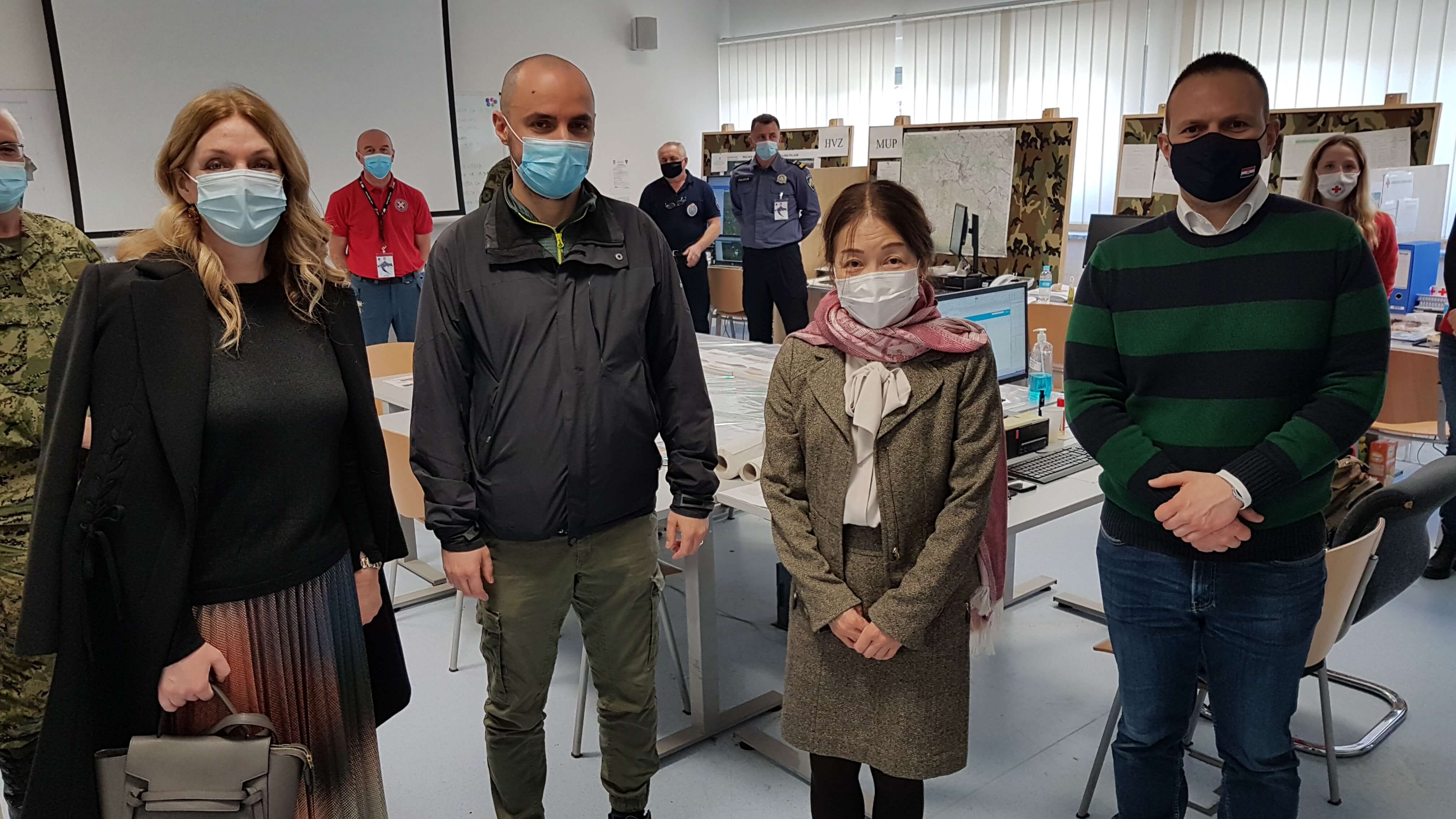
At the Civil Protection Headquarters for Dealing with the Aftermath of the Petrinja earthquake in December 2020, March 2021 © Japanese Embassy Croatia
Post-earthquake reconstruction by Japanese experts: Zagreb's buildings can keep their looks and also become safer
Japan is famous (or as Ambassador Kaji rated with a humorous touch, perhaps notorious) for regularly having earthquakes. Tsunamis happen as well. This was even noticed by reporters from the Croatian paper Jutarnji List, who, when following the earthquakes in Zagreb and Petrinja, interviewed Ambassador Kaji in search of advice on living with earthquakes. An equipped backpack with water, food, batteries, and lights ready for evacuation, along with agreeing on a location at which were to meet with your loved ones, are some great bits of advice for planning once you accept that earthquakes can happen at any time, anywhere.
''You can't stop earthquakes, but if you're prepared, you can mitigate the damage they cause and protect lives. People often think earthquakes happen, and that's that, but earthquakes are never over,'' said the Ambassador when recalling that interview.
''I was at my residence when the Zagreb earthquake happened more than one year ago, and the epicentre was just three kilometres away. It was pretty bad but not serious with only small cracks on the wall,'' recalled Ambassador Kaji, not seeming to feel unsafe in a Japanese earthquake-conscious building, while Croatia isn't always so aware that the Earth's plates can move and cause total chaos.
The earthquake that gave Zagreb such a heavy blow in March 2020 is a normal monthly, if not weekly, occurrence in Japan. The country's ultra-modern buildings and skyscrapers were built to sustain such rumbling, but even the traditional signature Japanese style of architecture (such as the signature Pagoda of Horyuji, the oldest wooden high-rise Japanese building built in 680A.D.) sustained numerous earthquakes over centuries, as Japanese builders always had to try to cope with earthquakes. But, with Zagreb being proud of its architecture, particularly in the downtown area, can the Croatian capital possibly preserve its signature look but also become safer for its residents if such magnitudes or higher strike once again?
''I asked some Japanese experts about whether or not it would be possible to preserve the nice, historic architecture of Zagreb and not just totally transform it into a modern but very common city, and they said it was possible. That needs investment, but there are ways to somewhat reinforce the basic structures and preserve their looks,'' assured Ambassador Kaji. She also added that the speed and focus of reconstruction is something Croatia can learn how to be better at from Japan.
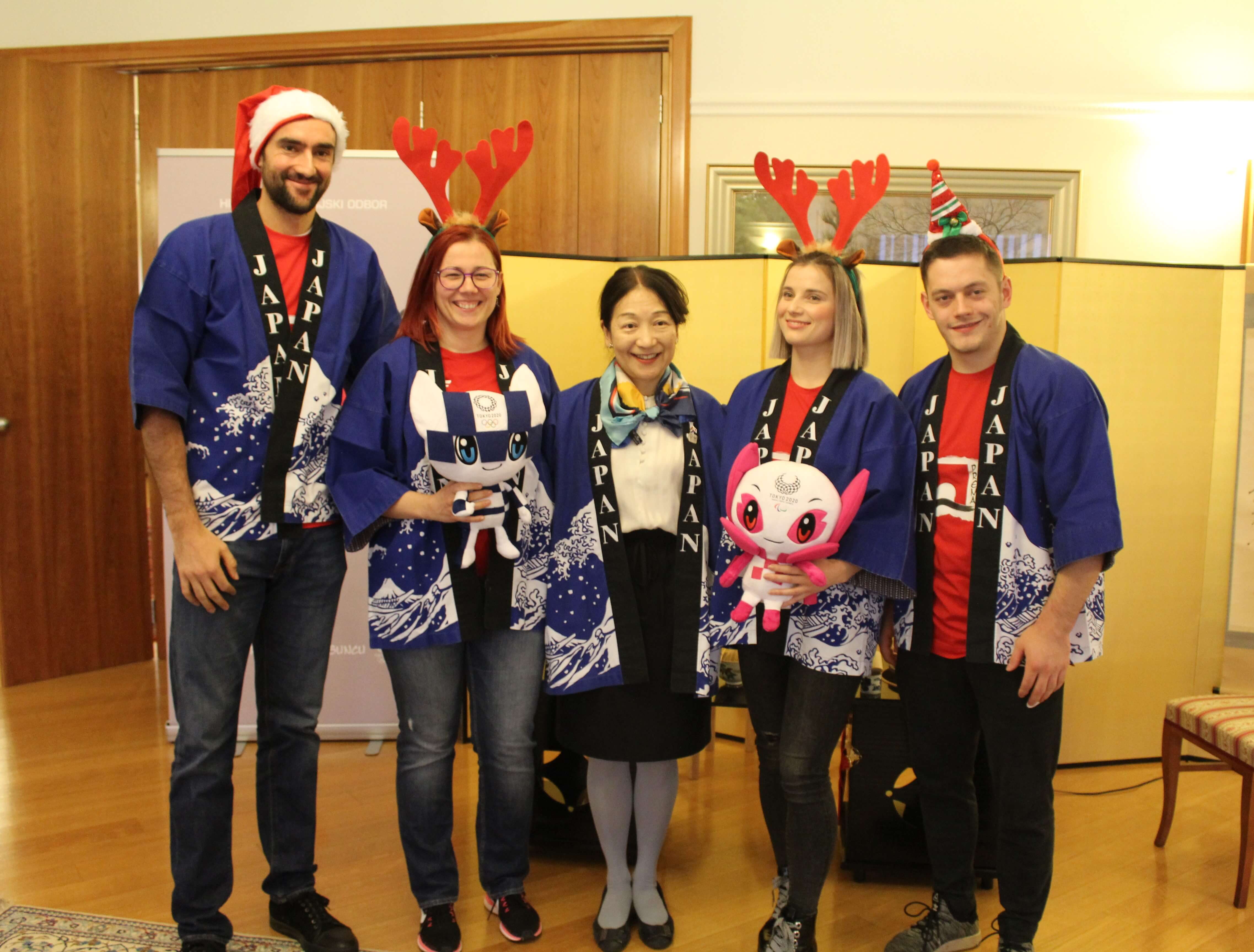
Towards the Tokyo 2020 Olympic and Paralympic Games, December 2019 © Japanese Embassy Croatia
The Adriatic is nice, but UNESCO heritage really excites Japanese people
With data acquired before coronavirus, Ambassador Kaji stated that there were 150 Japanese nationals living in Croatia, and 150,000 Japanese tourists visited the country. What several people noticed was that while many foreigners come to Croatia primarily to enjoy the coast and swim in the Croatian Adriatic, Japanese tourists can rarely be seen on the beach and prefer sightseeing.
''Japan is surrounded by the sea, so the sea isn't something amazing to them, but Japanese people are very interested in cultural heritage, and when something is recognised by UNESCO, people in Japan really rejoice. So, the Japanese are very much interested in historical or artistic values Croatia offers,'' explained Ambassador Kaji, clarifying why so many Japanese tourists can often be seen as frequently in continental Croatian towns and cities and not just on the coast.
Despite some Croats sometimes being a bit xenophobic or looking differently at people of other races, Ambassador Kaji was surprised when asked about whether there were any racial issues that Japanese people experienced and reported in Croatia.
''I don't know if things were different before regarding racial issues, but the story I heard when I came to Croatia was that back in 2011, many Croats gathered in front of the Embassy of Japan with flowers, candles, and cranes to express their grief and support regarding the Fukushima Tsunami and the earthquake,'' said Ambassador Kaji.
Just like those who came with flowers, the Embassy is equal and open, too. The Embassy issues scholarships for people wanting to study in Japan twice a year, and apart from being open to anyone that wants to travel to Japan and get informed about the country and visa requirements, the Embassy also has a library people are welcome to come to and read through Japanese books and literature.
Apart from being in regular contact with other colleagues based in Croatia, Ambassador Kaji also regularly contacts the Croatian Ambassador in Japan, Drazen Hrastic.
''Before I left Tokyo, we had dinner together, and now we talk often, as well,'' said Ambassador Kaji with a smile.
With Japanese culture being so appreciated in Croatia, and Croatian sporting heroes and UNESCO heritage being so beloved in Japan, spiced with common political values and friendly diplomatic relations, Croatia and Japan truly have the chance to learn from each other and continue to work on the further nurturing of their diplomatic ties, and their shared trade.
If you're a Japanese citizen or a Croatian citizen in need of information, here is how you can reach a Japanese diplomatic mission in Croatia:
In Zagreb:
Japanese Embassy
Adress: Boškovićeva 2
Mail:
Consular Section: This email address is being protected from spambots. You need JavaScript enabled to view it.
Political Section: This email address is being protected from spambots. You need JavaScript enabled to view it.
Economic Section: This email address is being protected from spambots. You need JavaScript enabled to view it.
Section of Culture / Public Relations: This email address is being protected from spambots. You need JavaScript enabled to view it.
Phone number: +385 1 48 70 650
In Split:
Consulate Office
Adress: Marasovićeva 67
Mail: This email address is being protected from spambots. You need JavaScript enabled to view it.
Phone number: +385 21 32 35 80
And of course, you can find all the latest news concerning Japanese-Croatian relations on the official website.
To read more from the series "Friends of Croatia", follow TCN's dedicated page.
For more about Japan - Croatia relations, follow TCN's dedicated page.
Friends of Croatia: Diplomatic Immunity
June 3, 2021 - The seventh article in the series, Friends of Croatia: Diplomatic Immunity brings you more details on diplomatic immunity, its boundaries, and examples of exceptions in accordance with the International Vienna Convention on Diplomatic Relations. Details on how the sentry Ministry of Foreign and European Affairs, are included too.
Being a diplomat isn't bad at all. You get to travel and explore the country you are assigned to, experience the new culture while promoting your own. Additionally, you work on improving bilateral relationships and contributing to the dynamic of the geopolitical scene (hopefully for the better).
Earlier in the series, there was an article dedicated to the key terms of diplomacy. But, there is one more thing that is worth giving special attention to: diplomatic immunity.
You probably might be thinking that means exemption from legal prosecution, and you are kinda right. But that doesn't just mean you can just do whatever you want, and law-abiding behavior is, of course, one of the needed characteristics to fit the job description.
In fact, the International Vienna Convention on Diplomatic Relations from 1961 has very clear instructions.
„The person of a diplomatic agent shall be inviolable. He shall not be liable to any form of arrest or detention. The receiving State (a State in which the diplomat is based) shall treat him with due respect and shall take all appropriate steps to prevent any attack on his person, freedom or dignity“, says article 29 of the Vienna convention. Its also worth adding that the same protection applies for his/her private residence, as well as papers and correspondence, and the diplomatic agent is also not obliged to give evidence as a witness.
But, for not everything to be all benefits and no responsibilities, article 31, despite repeating that „ a diplomatic agent shall enjoy immunity from the criminal jurisdiction of the receiving State and that diplomatic agent „shall also enjoy immunity from its civil and administrative jurisdiction“ – he lists exception. Such as in the event of a real action relating to private immovable property situated in the territory of the receiving State, (unless he holds it on behalf of the sending State for the purposes of the mission) or in the case of an action relating to succession in which the diplomatic agent is involved as executor, administrator, heir or legatee as a private person and not on behalf of the sending State and finally, in the event of an action relating to any professional or commercial activity exercised by the diplomatic agent in the receiving State outside his official functions.
Additionally, „the immunity of a diplomatic agent from the jurisdiction of the receiving State does not exempt him from the jurisdiction of the sending State“.
Ministry at your (diplomatic) service
With the Croatian Ministry of Foreign and European Affairs already stating for this series that they take diplomatic relations very seriously, they respect the convention, and their Diplomatic Protocol Office is here to help. As evident in their protocolar guide, they have an entire section dedicated to privilege and immunity.
„Diplomatic missions and international organizations accredited in the Republic of Croatia notify the Ministry of Foreign and European Affairs, to the Diplomatic protocol arrival of the (diplomatic) mission, attaching the diplomatic note, and the copy of the passport that will be notified“, states the guide in respects to the International Vienna Convention on Diplomatic Relations. The guide adds that when stepping on duty, the Diplomatic protocol will have a view in the passport of a notified person, and it will place a stamp with the following content that will confirm the passport was reviewed by the Ministry. Along with the date and signature to match. This leads to issuing a special identity card that then allows entering the Republic of Croatia without a visa.
„The special ID is issued to the members of missions and consulate offices, members of the UN organizations, and other specialized UN institutions, members of international organizations accredited in the Republic of Croatia, as well as members of their families or members of the shared household and members of private service“, elaborated the guide.
With the aforementioned documents, to get the ID, diplomats must also provide their photos and fill in a questionnaire which can be downloaded from the guide.
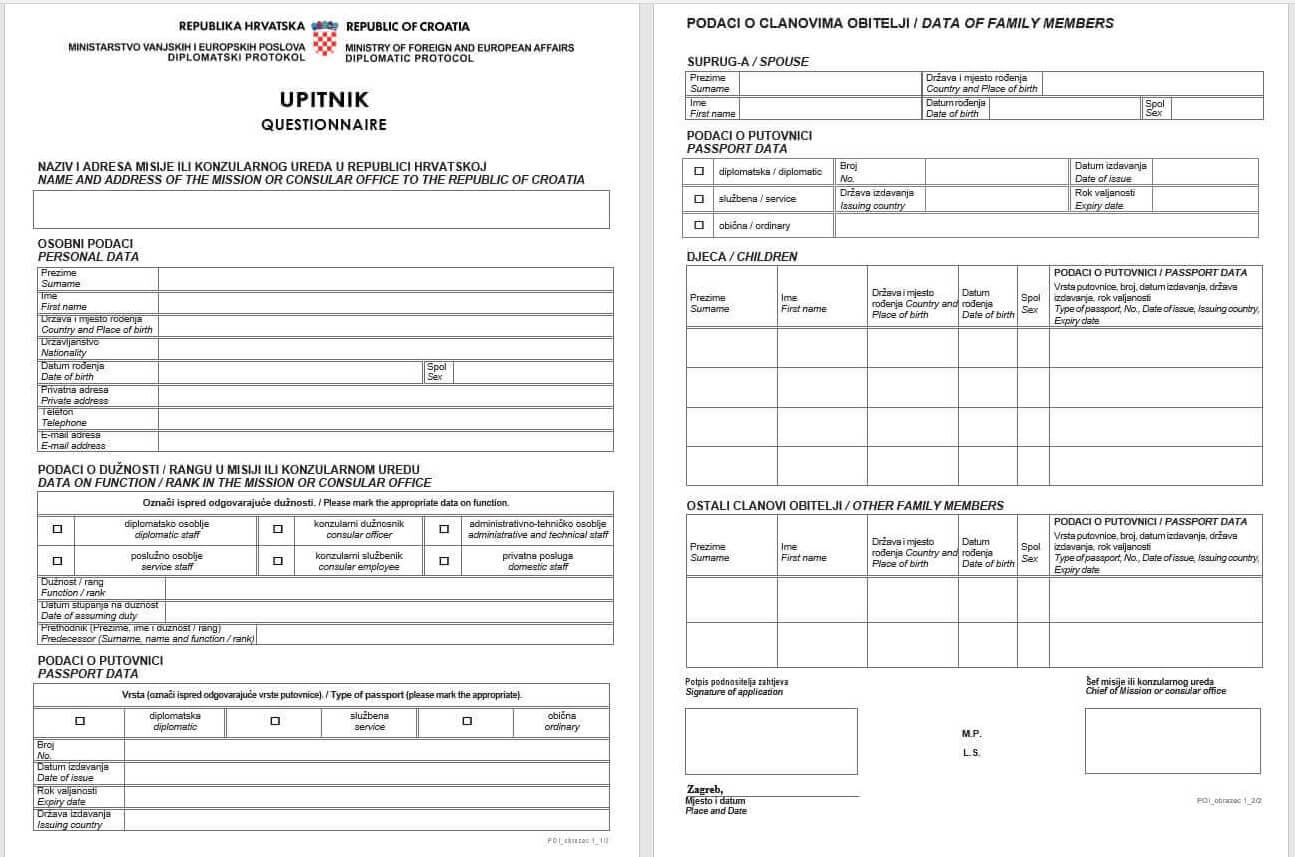
Diplomatic protocol questionnaire/screenshot, Total Croatia News
To read more from the series "Friends of Croatia", follow TCN's dedicated page.
For more about diplomacy in Croatia, follow TCN's dedicated page.
Friends of Croatia: UNICEF - Croatia an Example to the World When it Comes to Breastfeeding
May 27, 2021 - The sixth article in the "Friends of Croatia: UNICEF" series explores the work of the UNICEF Office for Croatia. What is done regarding children's rights in Croatia, positives, and negatives, and how can you help if you want to?
To ensure that our world even stays the same, let alone improves, new generations are essential. But, before they grow old enough to participate in society, society must first take care of the youngest ones to grow and develop. Society must ensure for kids that they grow up in families filled with love, make sure that kids can go to school, that they are healthy, safe from violence, that they are not hungry or thirsty, and give them overall opportunity to make it in the world.
Basically, children have rights, and they are in more detail elaborated in 54 articles. For more details, have a look at the Convention on the Rights of the Child that came to power on September 2, 1990, by the United Nations (UN) General Assembly.
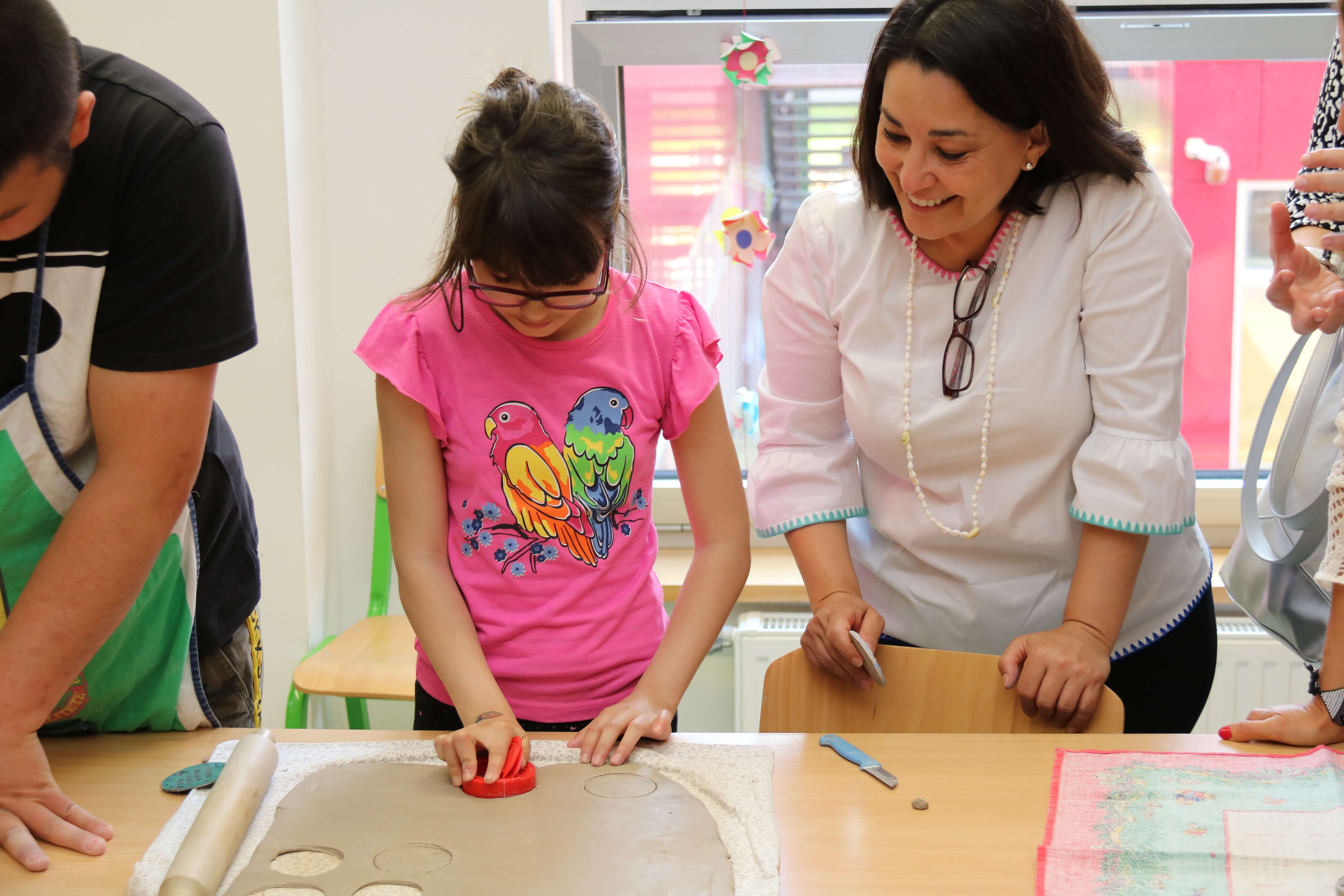
Regina M. Castillo, UNICEF office for Croatia representative with children with disabilities in Centre Tomislav Špoljar in Varaždin © Marin Ilej/UNICEF
The UN is dedicated to seeing this Convention is being respected, and United Nations International Children's Emergency Fund, commonly known as UNICEF, specializes in the issues of children's rights. Established in the aftermath of World War II, UNICEF has been at the frontlines of humanitarian crises, armed conflict, and natural disasters.
„Undeterred by the scale of the crises, we rise to the challenge, reimagine what is possible and respond by helping millions of children survive and thrive. Our on-the-ground expertise has reached more than 191 countries and territories, through committed partnerships and a passion for innovation“, says UNICEF on its official website.
Croatia signed and agreed with the Convention, and UNICEF today has its own office in Zagreb. Furthermore, it's worth noting that UNICEF has existed for 75 years, and despite firstly coming to Croatian territory while the country was part of the former Socialist Federal Republic of Yugoslavia, UNICEF has been with Croatia since the organization was established.
„Many people do not know that UNICEF helped to eradicate malaria in Croatia and that UNICEF played a key role in the development of modern dairy. Dairies were built in Zagreb, Rijeka, and Split, and factories for the production of powder milk in Osijek and Županja. Milk was distributed in schools, and for many children, it was their only meal during the day“, says Regina M. Castillo, UNICEF Office for Croatia representative.
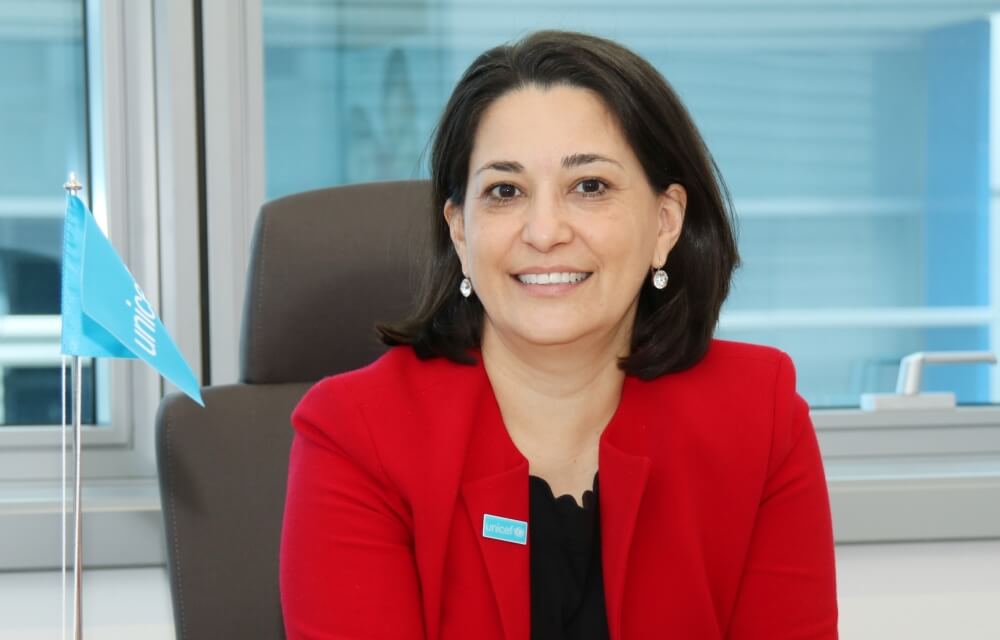
Regina M. Castillo, UNICEF office for Croatia representative © Marin Ilej/UNICEF
The UNICEF representative is elected for a five-year mandate, and Regina M. Castillo came to her function in Croatia in 2019. Her career in the UN started in 2001 and was in charge of economic and social questions in the Executive Office of the UN chief secretary Kofi Annan in New York. This was followed by Castilla moving to work in the mutual program for HIV/AIDS, known as UNAIDS. She was first the director of private sector partnerships in Geneva (2006-2012) and then moved to be the director for Bolivia, Ecuador, and Peru (2012-2015). She majored in International relations and public politics.
Born in Nicaragua, she first started her career in the 1990s as a diplomat, and she was also the headmistress for international trade in the Nicaraguan Trading Ministry.
Helping Croatia before it was cool (or an independent country)
Castillo went on to continue that after World War 2, UNICEF fed six million children every day, which included many children in Croatia.
„One of those children was our dear colleague, prof. Josip Grgurić, who is still working tirelessly for the youngest. He still remembers the yellow cheese that was part of UNICEF's humanitarian package for families, as well as the chocolate that he then tasted for the first time. He later worked at the children's hospital in Klaićeva, which UNICEF helped found, and he still works hard on UNICEF’s Child-Friendly Hospital Initiative“, says Castillo indicating how valuable but also inspiring UNICEF can be to children. Castillo added that in the Homeland War, UNICEF was the first organization on the ground, making sure that children and families received the necessary psychosocial support and humanitarian packages. After the war, they educated children on how to protect themselves from landmines.
Today Croatia developed, joined NATO and EU, and is a modern European country. With such progress, there have been many improvements in respect to children and their rights.
„Croatia has a low mortality rate of children under the age of five, extremely low stunted growth rate due to inadequate nutrition in the first years of life and the enrolment rate of children in primary school is almost 100 per cent“, pointed out Castillo.
„Croatia is an example in the world when it comes to the promotion of breastfeeding. It is rare that all public maternity wards in a country have the status of 'Child-Friendly Hospital'. With the support of UNICEF, partners have organized a network of breastfeeding support groups, and now we have more than 200 support groups in Croatia“, added Castillo on what the world can look up to this small South-Eastern European country.
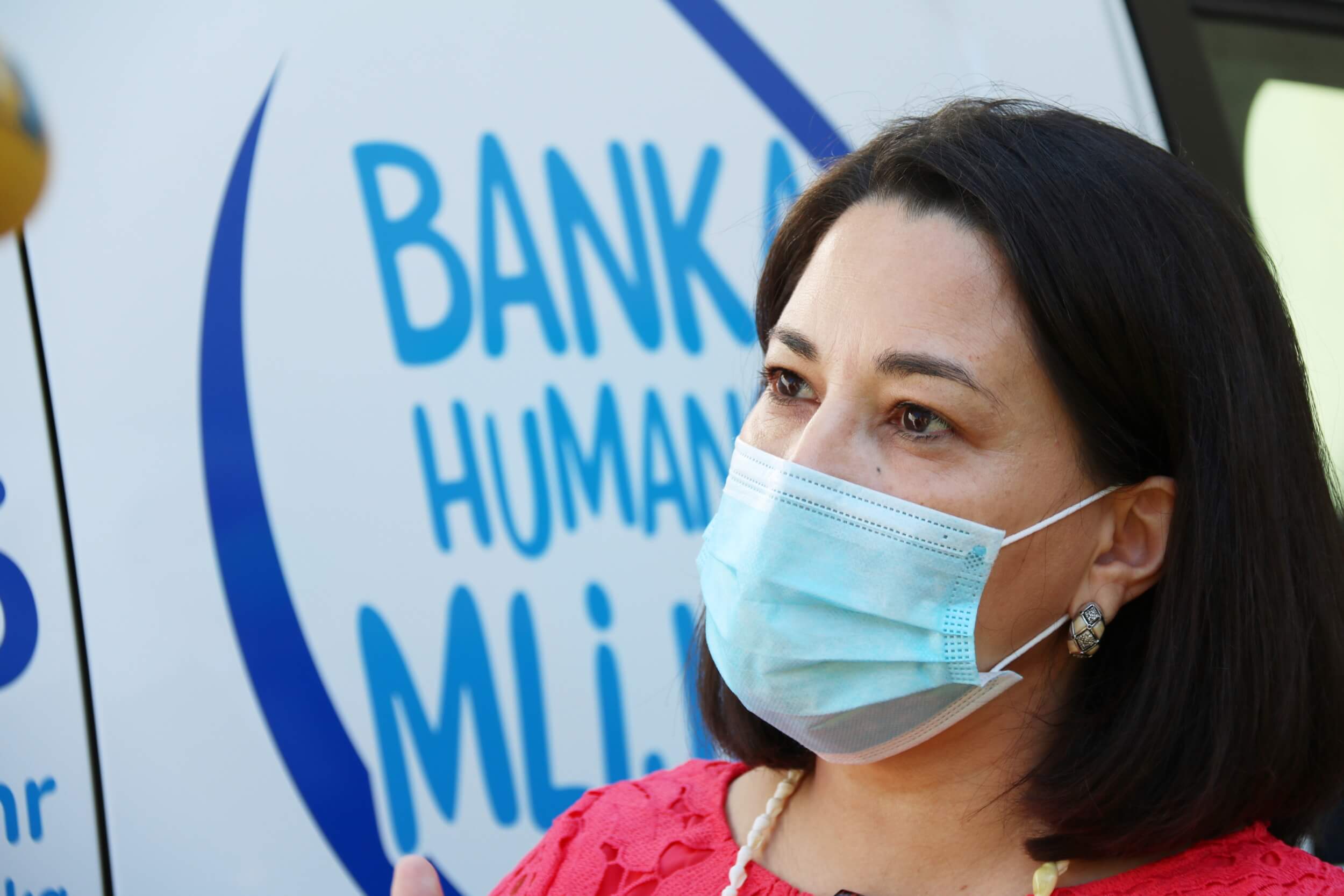
Regina M. Castillo at Human milk bank © Marin Ilej/UNICEF
Still, there are some issues Croatia needs to address and are far from ideal at the moment.
„There are still differences when it comes to access to services for children, depending on where they live and the conditions in which they grow up. Children with disabilities, as well as children from the poorest families, especially in rural areas, often do not have the opportunity to attend kindergarten and do not have the same access to specialized health services and therapies as children in urban areas. The focus of UNICEF in Croatia is on the most marginalized children: children with disabilities or developmental delays, children growing up without adequate parental care, children from minority groups, children at the risk of poverty and exclusion. UNICEF’s programs are focused on the well-being and protection of every child, with a special focus on the most vulnerable children“, pointed out Castillo.
Campaigns and programmes such as “Every child needs a family”, “The first three are the most important”, and “Stop violence among children” are perhaps the most known public action by UNICEF in Croatia, but returning to the good practices of breastfeeding, Castillo emphasizes the establishment of the Human Milk Bank in her current mandate.
„Thanks to the Human Milk Bank, prematurely born and seriously ill newborns (who do not have access to their own mother's milk) can receive milk donated by other mothers. We continually work on reducing the risk of disasters, support the development of quality foster care and provide support to parents in the upbringing and care of children through workshops and we work a lot with young people“, said Castillo.
In general, UNICEF has different types of offices in countries, and regarding the Croatian office, it’s a Country Office. In other words, most of the resources (human and financial) are invested in programs in Croatia. Castillo says that the five-year mandates have priorities that are determined in cooperation with partners. And while 80 percent of the funds raised are invested in programs for girls and boys in Croatia, there are funds and support programs for children outside of the country.
“For example, in 2018, UNICEF supported child health care in parts of Ukraine affected by the conflict and helped the building of five inclusive children's playgrounds in two refugee camps in Jordan in cooperation with the Ministry of Foreign and European Affairs in 2019. Through the ‘Schools for Africa’ program , which includes many kindergartens and schools throughout Croatia, UNICEF supports the education of girls and boys in Madagascar", Castillo listed several examples.

Regina M. Castillo, UNICEF office for Croatia representative with children on Media Literacy days press conference with Radovan Fuchs Minister of Science and Education, Krešimir Partl, State Secretary at Ministry of culture and media and Robert Tomljenović, Deputy Director of the Council for Electronic Media © Marin Ilej/UNICEF
Overall, the UNICEF Office for Croatia works closely with the Croatian Government, and most notably, with the Ministries of Social Welfare, Education, Health, and the Ministry of Foreign and European Affairs. Other partners also include experts (Croatian experts, but also building on expertise and good practice from all over the world), professional associations, academia, services providers, and NGOs.
“UNICEF’s goal is to connect all stakeholders and to advocate and support systemic change for the well-being of all children. System change is a gradual process, and it can be challenging, but when it comes to children’s rights, every step forward is well worth the effort”, explained Castillo.
Croatian citizens showing support for UNICEF
On one hand, Croatia is a good country with low mortality rates of kids and a role model for breastfeeding promotions. On the other hand, however, peer to peer violence (on whose suppression the aforementioned “Stop violence among children“ campaign works heavily on), and unequal approach to education between rural and urban areas show Croatia has both its ups and downs. Unfortunately. The downside sometimes overshadows all the positive things.
One such instance was the tragic death of a two-year-old girl from Nova Gradiška on Easter Sunday. The death of a severely injured girl, who was brought to Zagreb's children's hospital after suffering abuse and heavy beating from her biological parents (and from whom the girl was taken and given to a foster family but was then returned back to biological parents), sparked controversy and citizens outrage, culminating in changes in social welfare law, as well as sacks and investigations in the welfare center in Nova Gradiška.
„We are deeply saddened by the tragic death of two-and-a-half-year-old Nikoll on Easter Sunday. There are no words to express the pain of such a terrible event. Unfortunately, there are no simple and quick solutions to prevent violence against children. For years, UNICEF in Croatia has been continuously and persistently working in the field of child protection, educating experts from the social welfare system, but also other experts who work with children and families, such as experts from the health care, education, and justice systems. UNICEF implements various support programs for parents, and it is fully committed to the development of foster care and the improvement of the legislative framework. However, UNICEF is also aware that society as a whole, has a long way to go to achieve the goal that every girl and every boy is guaranteed the best possible care and protection. UNICEF will continue to work actively, persistently, and dedicatedly with all partners to achieve it”, commented Castillo.
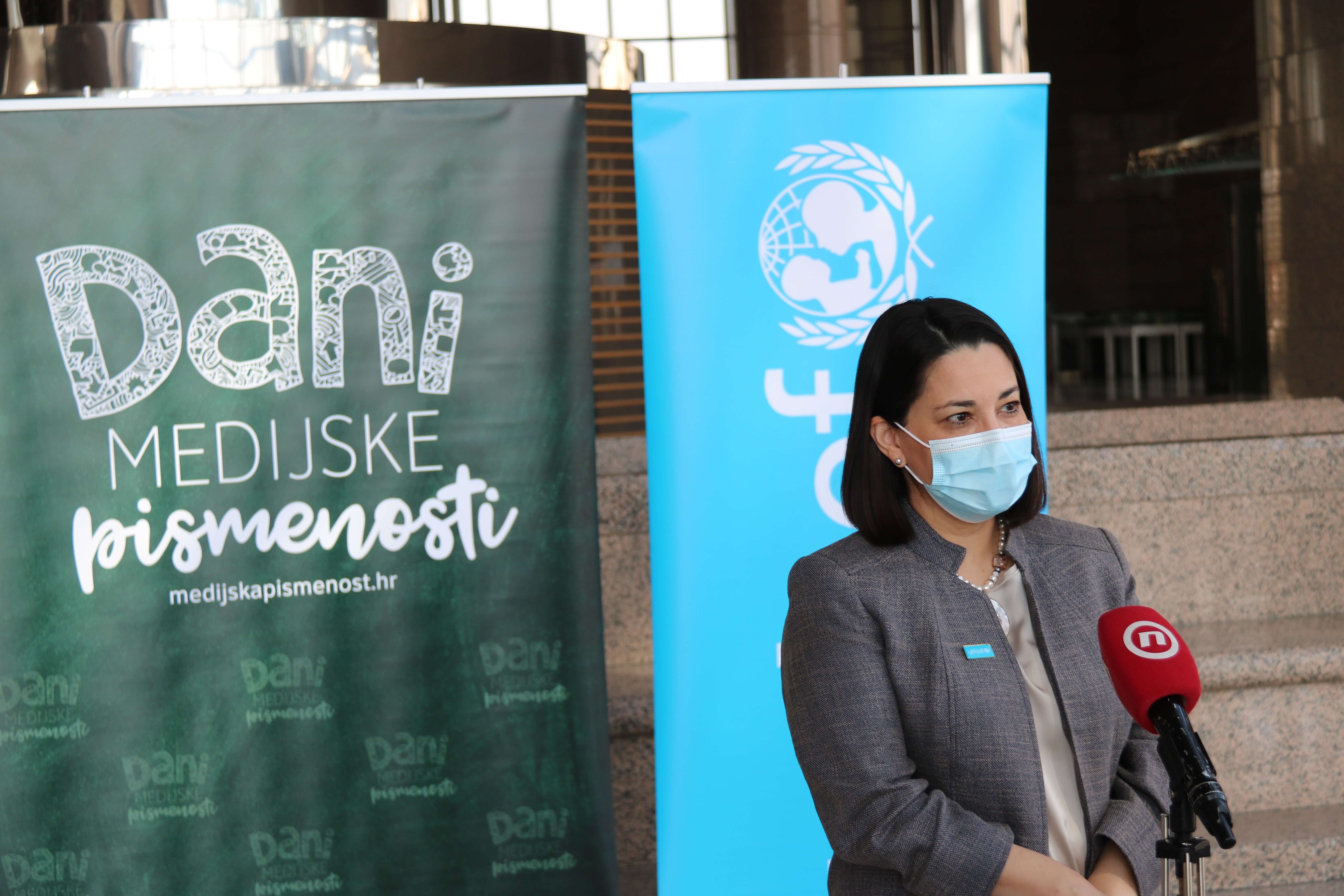
Regina M. Castillo talking on Media Literacy days press conference © Marin Ilej/UNICEF
However, Croatians recognize the importance of the UNICEF mission. Before Covid, UNICEF annually collaborated with the Museum of Illusions on the Museum of Reality exhibition which displayed the problems children faced worldwide, but which also showed what changes and solutions UNICEF brought to those areas.
“Experience tells us that citizens are ready to support the youngest, in Croatia and beyond. Implementation of our programs would not be possible without the support from citizens and companies that placed the focus of their CSR activities precisely on children. We especially value the support from our Childhood Guardians, donors who support our work with regular monthly donations and allow us to regularly conduct our programs for boys and girls, as well as react quickly with much-needed assistance in crisis situations like the earthquakes in Croatia and the COVID-19 pandemic that affected all families. UNICEF is always in the field with the most vulnerable children and their families”, notes Castillo.
In the end is important to note, that while children are recognised as a particularly vulnerable group, all human rights apply equally to children.
“All the rights enshrined in the Convention apply to every child, regardless of a child’s country of origin, gender, religion, and nationality. Every child, by birth, has all his/her rights, the right to grow up in a safe environment, to have a family, to have access to health care and education, to be able to play and develop his/her interests and reach his/her full potential”, concludes Castillo.
The five-year mandate is an agreement that sets priorities in advance, so Castillo warned that there is no opportunity for making donations outside of that framework. UNICEF office occasionally does get messages from citizens who need advice or help on issues outside of that frame, but nevertheless, UNICEF can offer them help by referring them to institutions and addresses that can offer citizens the necessary support, financial support, or information.
With expertise mentioned several times throughout this story as the insurance of delivering the best solutions to issues children face, UNICEF is always on the lookout for new people. If you want to make a change in the world while earning a fair wage yourself, check out what expertise UNICEF is looking for right now.
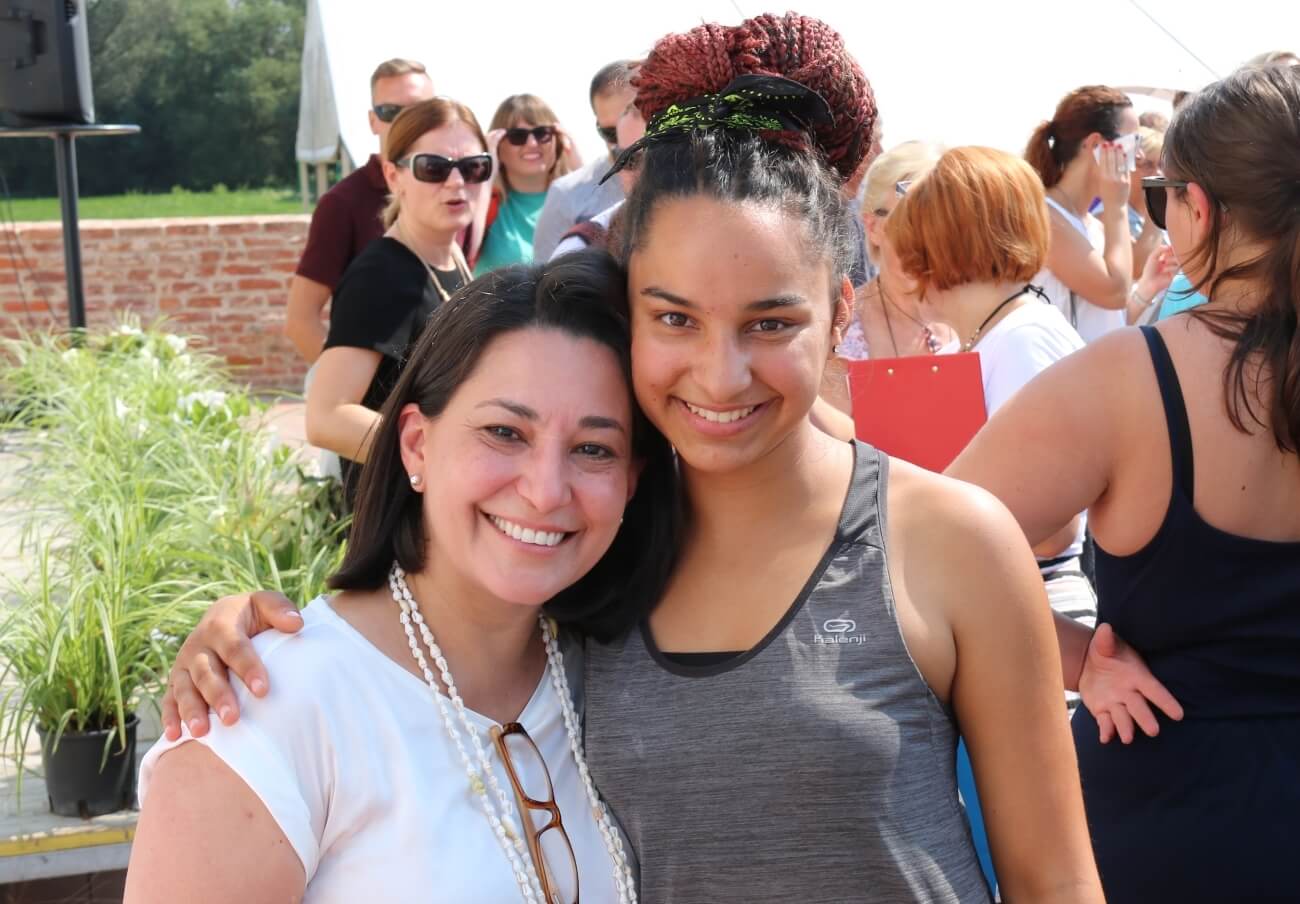
Regina M. Castillo on a foster family gathering © Marin Ilej/UNICEF
UNICEF Croatian Office is situated on Radnička cesta 41/7. To inform the public of their work, they built a considerable presence on Facebook, Twitter, Instagram, Youtube, and Linkedin. You can also find all UNICEF-related info for Croatia on their official website, and contact them via mail: This email address is being protected from spambots. You need JavaScript enabled to view it. or on phone numbers: +385 1 2442 660 and +385 1 2442 661. You can use the website to donate to a cause in Croatia too. Additionally, there are numbers: +385 1 4095 855, +385 99 2692 196, and +385 91 621 1039 for more details on donating to Croatia as well as e-mail address This email address is being protected from spambots. You need JavaScript enabled to view it.. You can also leave a donation to UNICEF in your will, and a phone number +385 1 3031 640 specializes for the issue in Croatia. If you find yourself in Croatia and you want to volunteer for UNICEF, more info can be found by sending a mail to This email address is being protected from spambots. You need JavaScript enabled to view it. and on phone number +385 1 3031 646.
And of course, you can donate for a good cause to UNICEF for any action the fund is internationally involved in.
To read more from the series "Friends of Croatia", follow TCN's dedicated page.
For more about UNICEF in Croatia, follow TCN's dedicated page.
Friends of Croatia: British Embassy - Brexit an Opportunity to Deepen Already Good Relationship
May 20, 2021 - The fifth article in the series "Friends of Croatia: British Embassy", saw TCN reporter Ivor Kruljac sit down with the UK Ambassador Andrew Dalgleish and discuss all things regarding diplomatic relations between the UK and Croatia. Diplomatic relations are, overall, really good and developing well, with Brexit being a challenge, but also an opportunity for deeper bilateral cooperation between the two European nations.
The diplomatic relations between the UK and the Republic of Croatia were formally established on June the 24th, 1992.
Almost 29 years later, I found myself in front of the Ambassador's residence and being warmly greeted by Snježana Vukić, the British Ambassador's advisor for communications. If you're inclined to think in stereotypes, you would expect a cup of tea, but instead, the cup of coffee with the creamy flat white texture turned out to be a much better beverage during the interview—both for me and for the Ambassador.
''We can sit wherever you like'', said Ambassador Andrew Stuart Dalgleish as he welcomed me inside the premises. A warm, kind, competent communicator that evened out the serious conversation about diplomatic topics with occasional humorous remarks to ensure both had an enjoyable and informative talk. The pins of both British and Croatian flags on his left coat lapel turned out to be a visual clue to the notion the friendship the UK and Croatia has long since held is still going well.
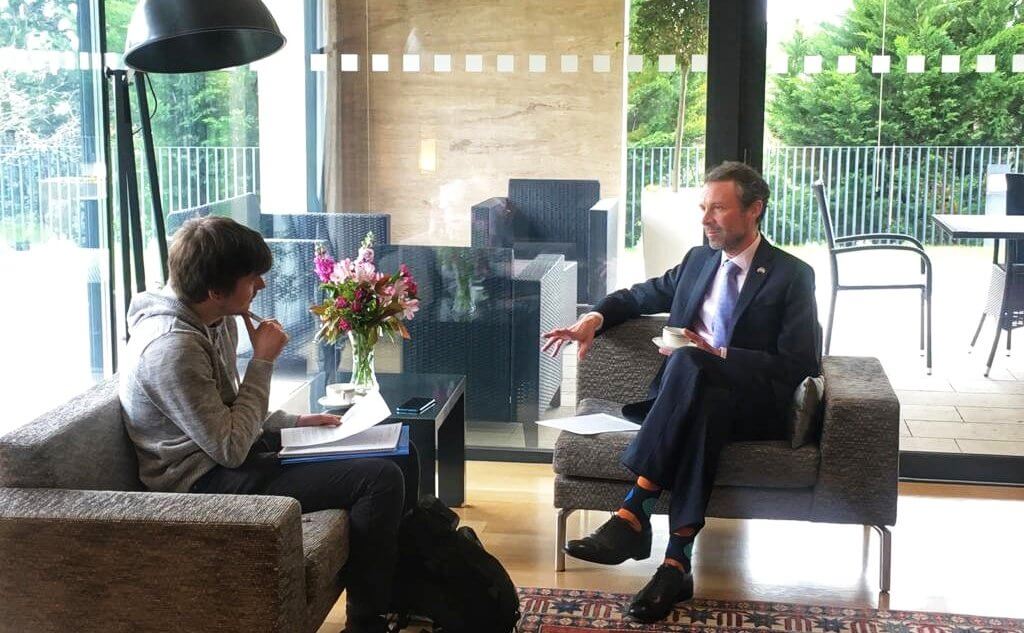
TCN reporter Ivor Kruljac with Ambassador Andrew Dalgleish © British Embassy Zagreb
Croatia and UK sharing western values
Andrew Dalgleish has served the UK as the Ambassador in Croatia since July 2016. He graduated with First Class Honours Degree in European Law at the University of Warwick, which included a year at Bordeaux University IV studying French Law. From 1998-1999 he worked in the Department of Social Security. His extensive knowledge of European law saw him work in UKREP (the United Kingdom Permanent Representation to the European Union) from 1999 to 2004, firstly as the Second Secretary for Social Affairs, and from May 2001 as a First Secretary for the Environment.
That same passion for the environment led him to DEFRA (Department for Environment, Food & Rural Affairs), where he was the Project Manager for the Climate Change effort during the UK Presidency of the EU, and he also represented the EU in UNFCCC plenary meetings. In his service to DEFRA from 2006 to 2008, he participated in the creation of the Office of Climate Change (2006), and moved to be the Deputy Head of Group, in Environmental Land Management too. From 2008 to 2011, Dalgleish continued working as the Head of the European Union Strategy Department, where he held preparations ahead of the Prime Minister’s European Council briefings and assisting other ministries in shaping deliverable policies; coordinating influencing strategies and lobbying efforts within the EU.
''I should tell you, I'd never been to Croatia before I arrived here professionally, and I'm one of those rare British people who hasn't been here on holiday“, Dalgleish began as I asked him about his impressions of the country, and of course, of Croats.
''What struck me the most was the warmth of the people, the welcome, general sense of friendliness. Croats are really proud of their country, and quite rightly so, and they also really want you to love the country too,'' said the Ambassador, adding that the Croats he met took him to lots of places and restaurants where he discovered various new dishes.
He continued that one of the delights of Croatia in his opinion is its variety, and he finds it impossible to pick one location that fascinated him the most.
''I remember going to Vučedol near Vukovar, and it was mindblowing. The walking that I can do in Žumberak, not far from Zagreb is fantastic. You go to Brijuni and you have Roman ruins, or you go to Poreč and you've got the basilica there, or Vis, which is a paradise,'' he stated in his list.
His description of Croats as warm and friendly seems to demonstrate to what we could call Croatian values. But, what are British values? When asked this question, Dalgleish argued that these are habits we may consider to be national characteristics, but they aren't values, per-se.
''Brits are very proud of the idea that we believe in fair play, that will we do the right thing even if we lose the game. Maybe that's why we're terrible at sports,'' the Ambassador said with a touch of humour as he was describing the national characteristics of British citizens.
While stating that Croats should be asked what the UK is most famous for in Croatia, as an Smbassador who frequently talks to Croats, he did manage to come up with some conclusions on the issue.
''Football, clubs such as Chelsea or Manchester City, but also the British sense of humour. Croats laugh at similar things as we do. So much British TV is here, and the cultural exchange is really, really important as well,'' said the Ambassado,r referring to cult shows such as Only Fools and Horses (Croatian: Mucke).
''The Royal Family is very recognisable here, too. I think lots of interest and affection is shown for the Royal Family, and of course our brilliant 'weather' “, the Ambassador added.
When it comes to joint values, the Ambassador noticed that Croatia and the United Kingdom share many opinions that are neither Croatian nor British values, but rather a Western, European, or even Transatlantic view of the world.
''This encompasses a wide range of things that we very often take for granted but which are the foundations of our societies", explained the Ambassador, citing examples the freedom of the media or the rule of law.
''The democracies we live in, embrace and find to be a really important foundation are what we need to protect and defend for the sake of our societies.''
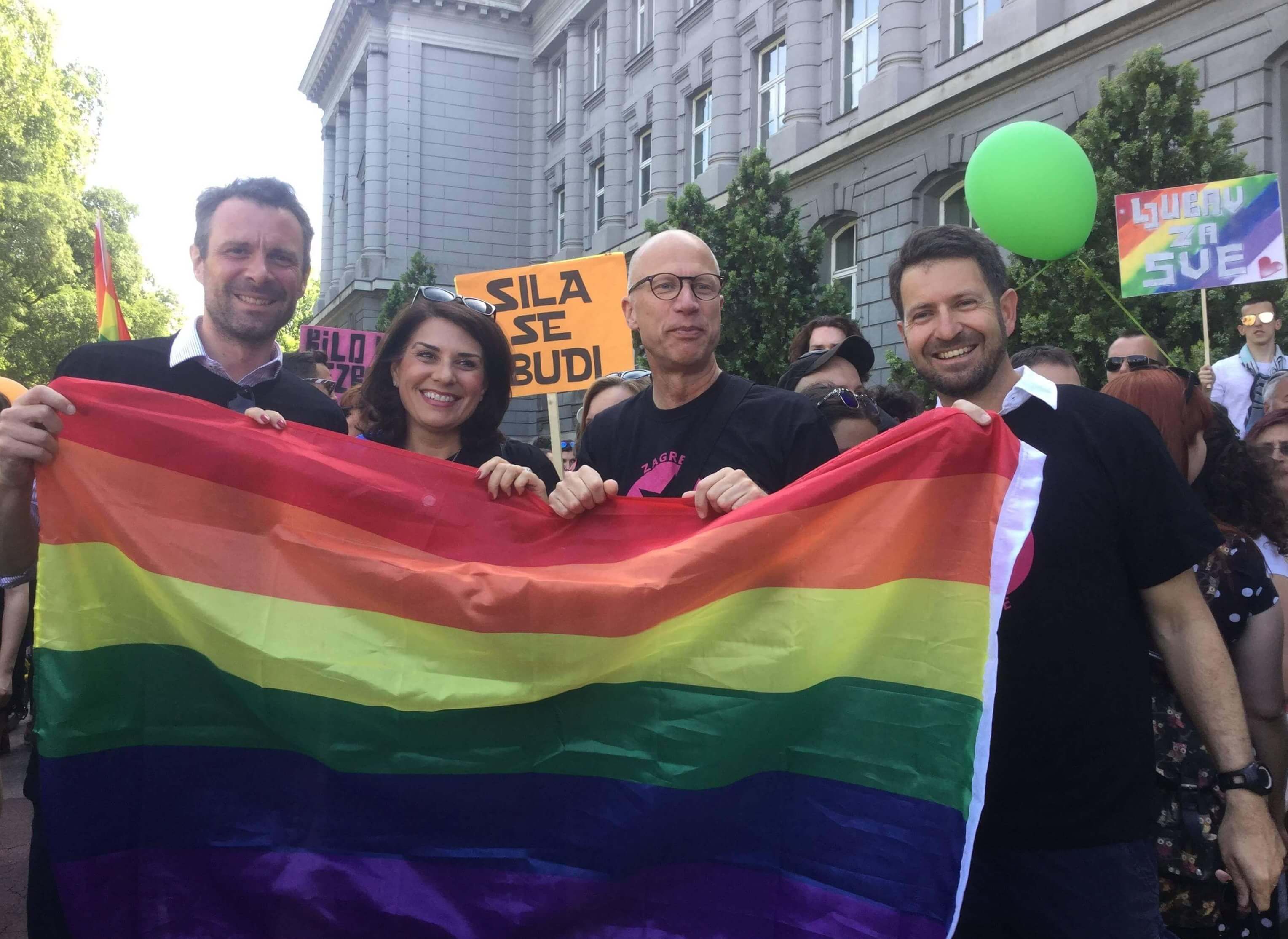
Zagreb Pride, Ambassador Dalgleish with other diplomatic colleagues during Zagreb Pride © British Embassy Zagreb
Things could be better at the commercial level, but there have been improvements...
The values ambassador Dalgeish described are the basis of diplomatic relations between Britain and Croatia, but how good is this relationship, actually? Where is it at its best, and where is it at its worst, where can things be better?
''The starting point is that diplomatic relations are really, really good, and I feel lucky that the cooperation our two countries enjoy is overwhelmingly positive,'' said the Ambassador. He added that as in any close relationship, two countries might disagree about something, but to the British Ambassador, being able to disagree and be fine with that is also a sign of a strong relationship.
''One great expression of our cooperation is NATO where we're really good, very close partners,'' continued the Ambassador, even referring to the recent DEFENDER-Europe-21 exercise in Zadar.
In addition to that, the recent visit of Royal Air Force Aerobatic Team to Croatia's Krila Oluje Pilots is also a good sign of cooperation and mutual friendship.

The Royal Airforce Aerobatic Team and the Ambassador © British Embassy Zagreb
''Croatia occupies an almost unique position in terms of expertise that it can give on Southeastern Europe, as well as comprehensive understanding of what is a very complicated situation in this region,'' he said.
''All of this is very good, strong and positive, and it makes a global impact, and it's not just about how our two countries get along,'' he said.
The Ambassador also added that both Croatia and the UK are members of the Global Media Freedom Pledge and stand for freedom in the media. He also works very closely with both the Croatian Government and Croatian president Zoran Milanović to promote awareness of the threat of climate change.
''You'd expect me to say I communicate the most with the Ministry of Foreign Affairs, and it would be true, it's where diplomatic relations are grown in a formal way. But I also communicate with all branches of the Government, with Parliament and with Pantovčak. Just today, I've been to the ''Dr Fran Mihaljević'' Clinic for Infectious Disease in Zagreb where I talked with its director, Professor Alemka Markotić, about what we can do about COVID-19“, added the Ambassador.
However, as expected, there are areas in which British-Croatian cooperation could be much better.
''Where I'd like things to be better, speaking very frankly, is in commercial relations. The UK has been less present on Croatian market and less accessible due to simple geography, especially when compared to the likes of Austria or Germany. When I arrived here, this is where I said I'd want to try to make a difference. I have made a difference, I hope. A small difference, but its a difference in the right direction, and the commercial relationship is better for that today,'' said the Ambassador.
These small steps saw trade in goods between the United Kingdom and Croatia increase by about 10% in the past few years, a good indicator of how things have been advancing, regardless of the concerns in the past that Brexit might affect it negatively.
''We've also seen investments from the Croatian side into the UK increase in the past few years – for example, Mate Rimac has just opened his research & development centre in the UK – we did help facilitate that through our Department for International Trade (DIT)“, added Ambassador.
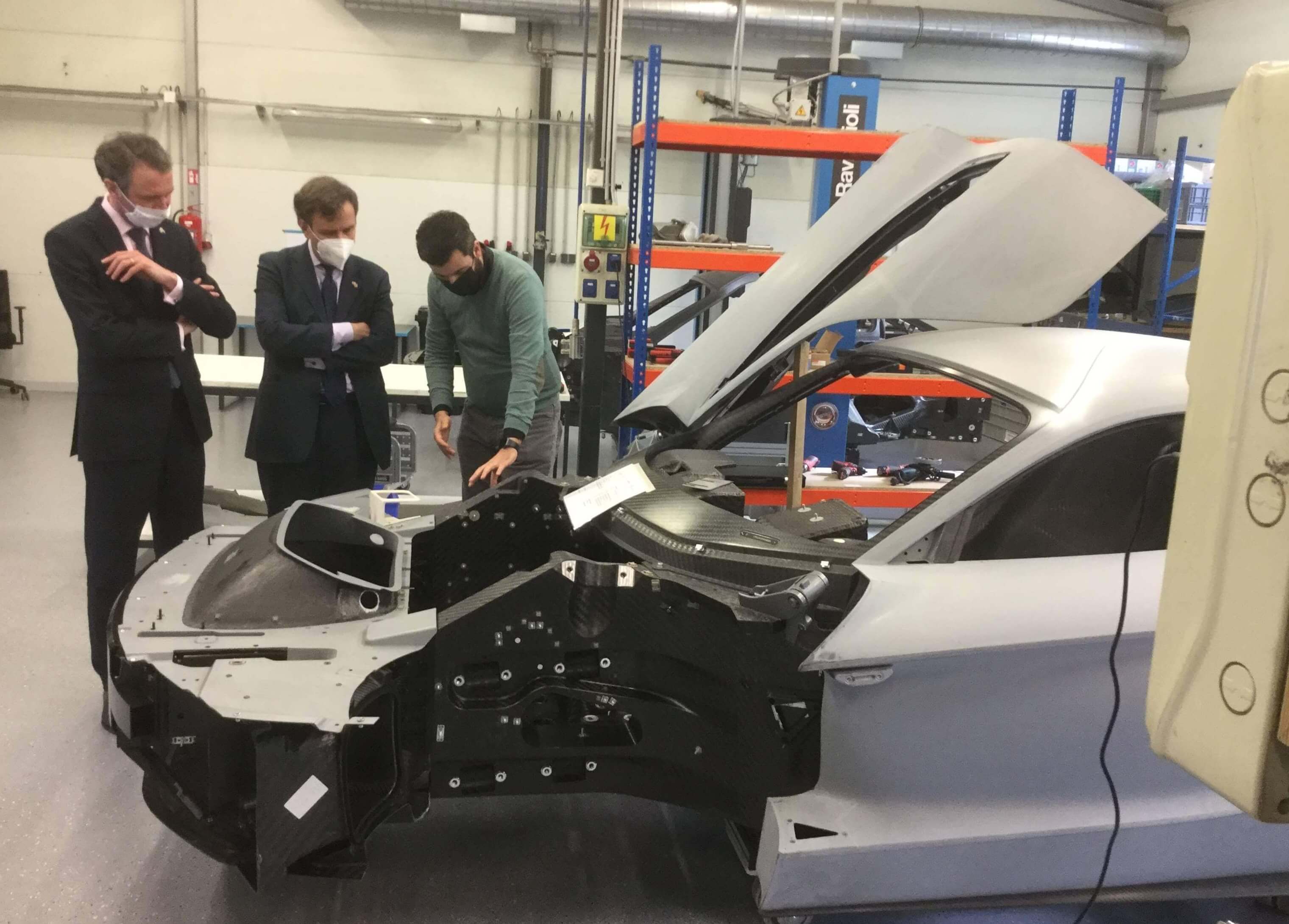
UK Minister Greg Hands and Ambassador Andrew Dalgleish with Mate Rimac in Rimac Automobili © British Embassy Zagreb
In addition, the Ambassador used every opportunity to facilitate business and trade contacts between the UK and Croatia. When UK State Secretary in the Ministry of International Trade, Greg Hands, visited Croatia last month, the Ambassador hosted a dinner for him with several leading Croatian business figures for both sides to explore how they might further improve business connections between the two countries.
On top of that, the recent confirmation from the Justice Ministry that British citizens may purchase property in Croatia only further benefited the development of trading between the two European countries.
Leaving the table for face to face conversation
The cooperation Ambassador Dalgeish described sounds great, but when it comes to diplomatic relations with the UK, the elephant in the room screams out in need of a special mention. Brexit remains a hot topic for the British public, and as Croatia is a member of the EU, what changes can Croatia expect in diplomatic relations with the UK as the European island nation which chose to step away from the bloc?
Dalgleish sees Brexit both as a challenge and as an opportunity to deepen diplomatic relations between the UK and Croatia.
''With 28 members states as it was before, you had so many people around the table that when ministers came together for a council meeting, there were just too many people to have a meaningful conversation one on one. So you'd say ''see you in Brussels'', and you would, and you'd wave, and you'd smile, and you might even say hello. But you don't have a meaningful conversation all the time,'' said Ambassador Dalgeish from his own recollection as he spent a lot of time in Brussels.
''We aren't at that table anymore. That means we're going to have to make more of an effort but also that we will have the opportunity to build a more meaningful relationship with Croatia and I think that's quite exciting for me in the job that I do,'' said ambassador Dalgleish calmly but optimistically.
''Whereas before, our bilateral business might have been conducted during these convenient moments in Brussels at these meetings, that doesn't happen anymore. Now, we will hold them in London, and we will hold them in Zagreb. I think that's quite the opportunity to build something more meaningful than what we had in Brussels,'' stated the Ambassador.
As the UK has a massive impact on the world and can boast of very strong diplomatic relations with other big players on the geopolitical stage, I wondered how important the relationship with Croatia actually is, from the UK's point of view, and in regards to the country's interest in global affairs.
''We look at Croatia as a global partner, and not just from the point of what we get from this bilaterally, but in what we're doing together to make a difference; Croatia sits as a partner,'' the Ambassador pointed out.
Already having mentioned the importance of Croatia's knowledge on Southeastern Europe and the instances of good cooperation through NATO, and issues such as climate change or COVID-19, the British Ambassador's claims are evidently backed up.
''I was sent here by the Foreign Secretary with a very serious mission to deepen the strength of the cooperation that we enjoy. It's a very important mission for me, and I think that's a reflection of how seriously we take the relationship with Croatia,'' confirmed the Ambassador.
The British Royal Family has always been very welcome in Croatia
The Ambassador already mentioned cultural exchange, and the British Embassy as an institution plays a significant role in the cultural promotion of the country. But, given the UK consists of four nations: England, Scotland, Wales, and Northern Ireland, is it possible to represent all these cultures equally? Being Her Majesty Queen Elisabeth II's Ambassador and representing the United Kingdom of Great Britain And Northern Ireland, Dalgeish shows his dedication to the job by equally representing all of the UK's four nations.
''We will proudly fly the St. George's Cross when it's St George's Day for England, but also the Saltire (Scottish flag), when it's St. Andrew's Day. I wouldn't say there is one element of the four nations that is dominant,'' said the Ambassador.
Culture is heavily linked with history, and the UK has been known in the past as a vast empire with colonies that are sovereign independent countries today. As Croatia was never colonised by the UK, are there any differences between the UK's relations with Croatia compared to other countries?
''The UK has a very long list of diplomatic relations, both with the countries who are part of Commonwealth, who were previously colonies, and with countries who were not colonised. So, there's no difference in forming a relationship with Croatia in comparison to such countries. There's nothing I can do about what happened in 1600's or 1700's, but I want to see what we can do in 2021,'' said the Ambassador, stating that the Ambassador's job is to look ahead, not backwards, to work on building the future, while acknowledging all the sensitivities of the past.
As the Ambassador already mentioned, his regular cooperation with the official bodies of the Republic of Croatia is the formal level of communication, while cultural exchange also has a key element in non-formal communication, particularly in education.
''I love going to schools. Talking to the kids about what they think about the UK, and what can they teach me about Croatia, and going to English lessons and causing chaos,'' said the Ambassador on his experiences with the school system in Croatia.
With the mention of the school system in Croatia, I couldn't help but recall my experience in education. Croatians seem to be quite talented when it comes English, but it is mostly pushed towards the American version of English.
''Oh yes I know, it's tragic,'' Ambassador Dalgleish joked in response when I shared my recollections.
He continued by saying that he is happy to see Croats speaking English so excellently, and he doesn't mind what version they learned, nor does he have any intention to have British English compete with American English.
''I don't hear too many American accents when talking to Croats, maybe it has something to do with British TV shows, maybe it doesn't, I don't know. But either way Croats should be very proud of how well they speak English,'' he concluded.
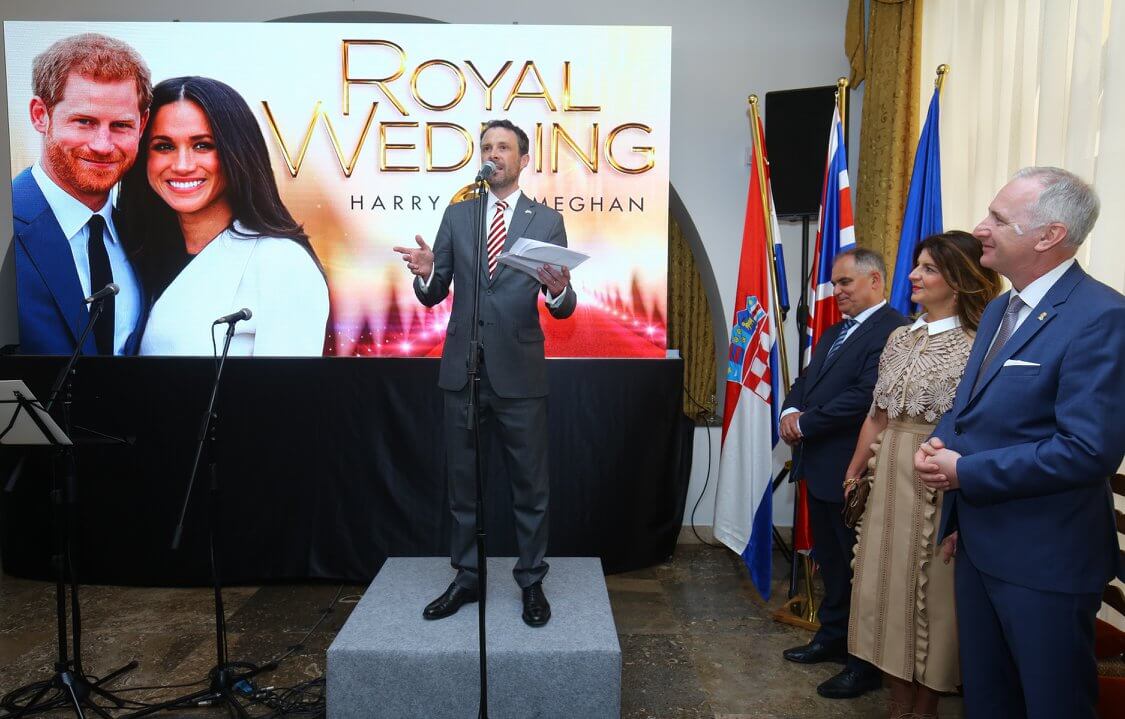
Ambassador Dalgleish on the Royal Wedding Party in Split © British Embassy Zagreb
As also already mentioned, the Royal Family is a big part of the of the fabric of Britain as it is a parliamentary monarchy.
The Royal family, particularly Prince Charles and Duchess Camilla seem to be very fond of Croatia indeed. Their last visit back in 2016 (following the Prince's earlier visit in 1996) saw the meeting with former Prime Minister Tihomir Orešković, former President Kolinda Grabar Kitarović, for whom Prince Charles highlighted his particular interest in the Croatian economy, as well as an interest in investing in Croatian youth. They also attended the commemoration of the 400th anniversary of the death of the famous English writer and poet William Shakespeare at the Croatian National Theatre (HNK) in Zagreb.
''Their Christmas card even had a photo of them with the members of a folk band from Osijek“, said Ambassador Dalgleish referring to the photo the British Royals took with the dancers of the HKUD 1862 ensemble.
And as Glas Slavonije reported, Osijek is very special to Prince Charles as his Great Grandfather Franz von Teck was born there.
Most recently, however, the Royal Family suffered a tragic loss as the much-loved Prince Philip passed away. Croatian Prime Minister Andrej Plenković expressed his deep condolences to Queen Elizabeth II publicly on Twitter, but as the Ambassador pointed out, he also sent condolences through official channels. Social media and overall technological progress now allows world leaders to communicate more directly, but it doesn't diminish the role of the British Embassy.
''Everyone who wanted to express their condolences, expressed them, from Pantovčak, to Parliament and the Government. Social media is an additional tool for us regarding public statements, but of course, embassies remain here for those sensitive issues that need to be discussed Government to Government, not over social media. We're also here for our citizens, and we can't be present in the whole country, so travelling, but also social media, are also very important here,'' explained the Ambassador.
The always attractive Dubrovnik was found to be the best example when it comes to culture in the country, as Game of Thrones and Star Wars were filmed there.
In the UK, the film industry, in addition to private incentives, gets financial support from the state, as the British Film Institute (BFI) is sponsored by a Government department. Following the examples of Star Wars and GoT, could there be more promotion from the BFI of Dubrovnik or Croatia in general as a good filming location?
''I don't really need to say anything about Dubrovnik. Dubrovnik speaks for itself, and more Brits visit Dubrovnik annually than anyone else,'' said the Ambassador with delight.
But if Dubrovnik did happen to need a good word or two; the Ambassador stated that he is not the tourist bord, and promoting Dubrovnik is not part of his duties.
''If someone from the UK contacts me and says that wants to film anywhere in Croatia, but is facing problems, then I'm here. But in general, the less I need to intervene, the better“, said the Ambassador adding that he found out about UK film producers filming in Croatia after it had already happened. One of the more recent examples of that was the filming of the ''The Ipcress File'' series in Zagreb, and the fact that the ambassador didn't need to intervene again only proves the steady and good relations between the nations.
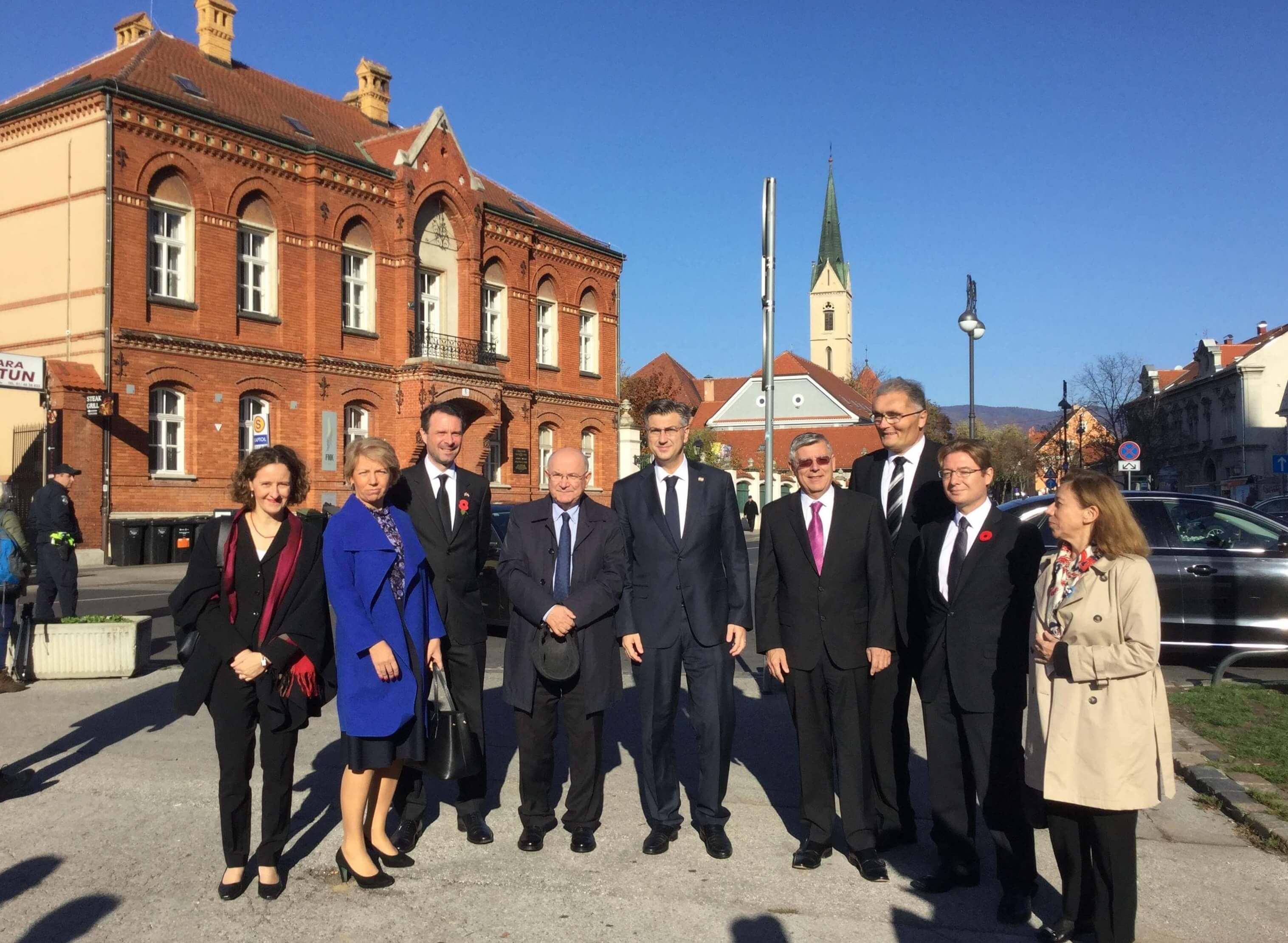
Ambassador Dalgleish, other Ambassadors and Croatian officials attending a Mass for all victims of WW2 at the Zagreb cathedral © British Embassy Zagreb
British and Croatian Ambassadors: Swapping countries but closely talking and cooperating
Foreign embassies, of course, are in Croatia for foreign citizens, and the British Embassy is no exception to that rule.
In addition to the British Embassy and a consul in Zagreb, the UK has two additional consuls: in Split and Dubrovnik, to make sure it is present for UK citizens, not just visitors, but also for Brits who work and live in Croatia.
''We have an honorary consul in Dubrovnik, which isn't officially part of the embassy, but is there to assist our citizens visiting Dubrovnik,'' pointed out Ambassador Dalgleish praising honorary consul Mark Thomas for doing a great job.
When it comes to Croats, visas to visit the UK are luckily not needed, but Croatian citizens can contact the embassy to get more information about Great Britain should they need to.
''When it comes to trying to invest in the British market or getting their products or expertise into the UK, Croats need to contact the Croatian Embassy in London. I'm frequently in contact with the Croatian Ambassador there, Igor Pokaz, who is doing a brilliant job for our two countries to fund and nurture different ways of cooperation,'' explained the Ambassador when discussing his relationship with the Croatian Ambassador in London, Igor Pokaz.
Overall, British-Croatian diplomatic relations are good in general, and the Ambassador's assurance that Brexit can be an opportunity to deepen the already good relationship is a promise to the bright future of friendship. But, as it takes two to have a combo as good as fish & chips, Croatia also has to show that it is willing to continue to develop a good friendship with the UK.
If you're a British citizen or a Croatian citizen in need of information, here is how you can reach a British diplomatic mission in Croatia:
In Zagreb:
British Embassy
Adress: Ivana Lučića 4
Mail: This email address is being protected from spambots. You need JavaScript enabled to view it.
Phone number: +385 1 60 09 100
British Council (for cultural realations):
Adress: Savska 32
Mail: This email address is being protected from spambots. You need JavaScript enabled to view it.
Phone number: +385 1 48 99 504
More info on British Council official website.
In Split:
British Consulate
Adress: Obala Hrvatskog narodnog preporoda 10/III
Phone number: +385 1 60 09 100
In Dubrovnik:
British Honourary Consulate
Address: PP 454
Phone number: + 385 1 60 09 100
For all the latest news about the British Embassy straight from the source, visit their official website. You can also follow them on Facebook, Youtube, Flickr, Instagram and Twitter (the British Ambassador is on Twitter and Instagram too).
To read more from the series "Friends of Croatia", follow TCN's dedicated page.
For more about UK - Croatia relations, follow TCN's dedicated page.
Friends of Croatia: Ministry of Foreign and European Affairs - The Croatian Side of Diplomatic Relations
May 13, 2021 - The fourth article in the series "Friends of Croatia: Ministry of Foreign and European Affairs" takes a look at the Croatian diplomatic relations from the perspective of the appointed ministry for diplomatic questions and foreign relations.
It takes two to build a friendship. While this series focuses on conversations with ambassadors, diplomats, and representatives of international organizations in Croatia, what is the official take on diplomatic relations and diplomacy from the Croatian side?
The Ministry of Foreign and European affairs (currently run by minister Gordan Grlić Radman) is the branch of the Croatian government that is the first and foremost point of contact and communication with the international community. If you are a country that wants to have diplomatic relations with Croatia, this is the ministry to reach.
„If diplomatic relations have been established between two countries, the sending country expresses the intention of opening a diplomatic mission (Embassy) to the receiving country, in this case, the Republic of Croatia, with a verbal note and seeks the consent of the competent institutions of the Republic of Croatia“, explained the Ministry the process of establishing Embassies.
„The competent authorities of the Republic of Croatia carry out the procedure of issuing the consent for the opening of a diplomatic mission and, upon its completion, inform the sending country about the outcome by verbal note. If the decision on giving consent for the opening of the Embassy in the Republic of Croatia has been granted, the sending country can start searching for a location to accommodate the Embassy and start the procedure of appointing an Ambassador," the Ministry added.
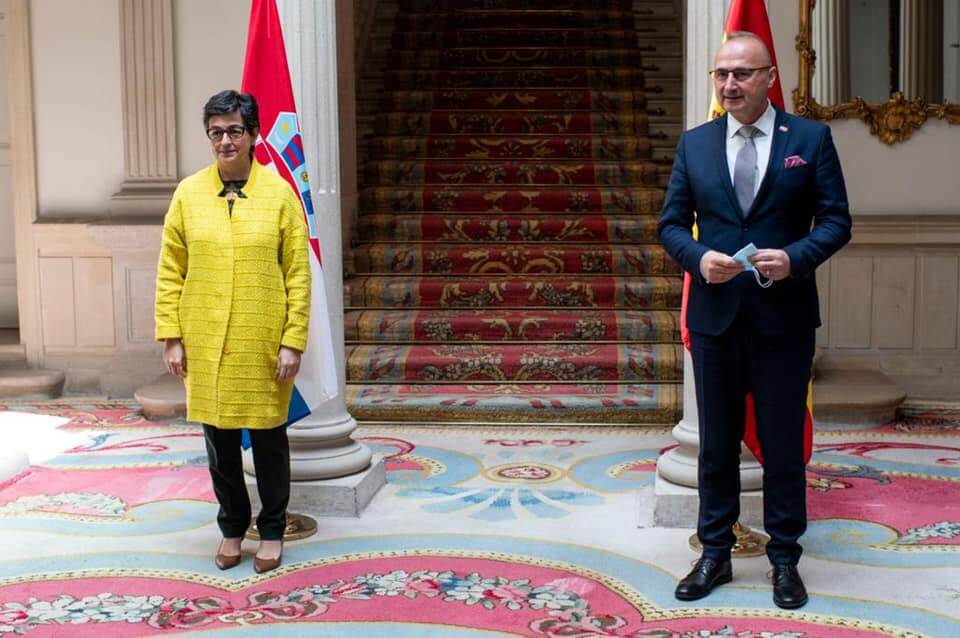 Foreign Minister Gordan Grlić Visiting Spain © Ministarstvo vanjskih i europskih poslova
Foreign Minister Gordan Grlić Visiting Spain © Ministarstvo vanjskih i europskih poslova
With this procedure in place, concluding with 2021, Croatia has 56 resident Embassies, 67 non-resident Embassies, 4 Consulates General, 3 Representative Offices of the bodies of the European Union, 8 Representative Offices of international organizations, and 103 Consulates General/Consulates/Vice-consulates (which what is interesting, as the Ministry pointed out, are handled by honorary consuls who are mostly Croatian citizens).
„Resident Embassies can be based only in the capital city, and they are headed by an ambassador. Non-resident Embassies are located outside the state, with a seat in some other country, usually, an EU member state, while Consulates Generals can be located in other larger cities besides the capital and are headed by general consuls and responsible for their work to the Embassy of the said country“, explained the Ministry.
Croatia may be a young county with 30 years of sovereignty, but the tradition of its diplomacy is traced deep in history. Most notably, in the Dubrovnik Republic, a role model to Croatian diplomats even today.
„Croatian diplomats take pride and inspiration in the tradition of diplomacy of the Dubrovnik Republic. As a small country, surrounded by powerful empires and influential Mediterranean city-states, with no military force, the Dubrovnik Republic was able to preserve its foreign policy sovereignty mainly thanks to the diplomatic skills and the awareness of its geopolitical position. These very qualities are constantly a source of inspiration for those who defend the interests of the Republic of Croatia on the modern world's stage“, explained the Ministry.
As is evident by following the work of the Ministry of European and Foreign Affairs, Croatia takes its diplomacy very seriously, and of course, with some countries, this is more evident than in others. One of the most recent examples was with Egypt. At the end of March, as TCN reported, Croatia showed solidarity with Egypt donating 100 books, and additionally, Croatian companies expressed interest in doing business on the Egyptian market.
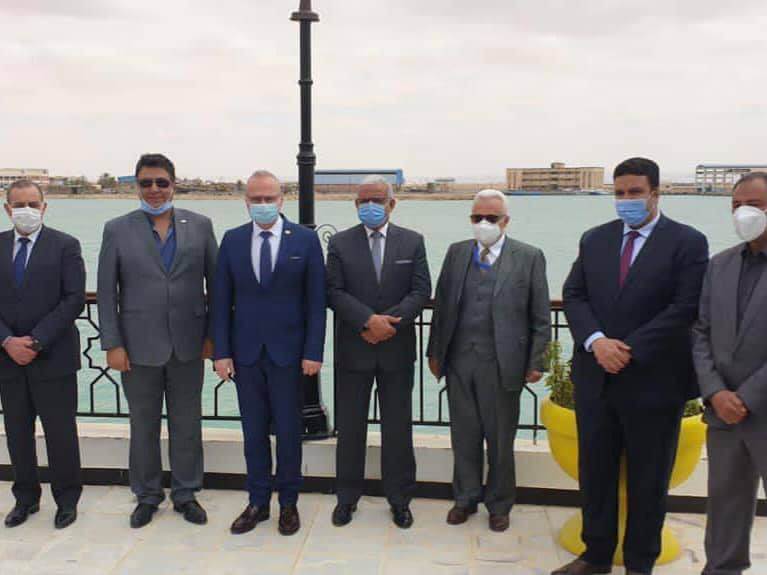
Foreign Minister Gordan Grlić in Egypt © Ministarstvo vanjskih i europskih poslova
„Minister Grlić Radman’s visit to Egypt was very successful, with his Egyptian counterpart Minister Shoukry opening a business forum which was attended by more than 120 Egyptian and Croatian business people“, said the Ministry, adding that representing the interests of Croatian companies and Croatian economy, in general, is an important task for Croatian diplomacy“.
Companies can ask for help by contacting the Ministry, specifically the Directorate General for Economic Affairs and Development Cooperation, or the Croatian embassy in the country of interest directly. No matter which way the request is made (regardless of whether the company has contacted the Ministry or the Croatian embassy in the country of interest directly) the company is kindly asked to fill out a request for support to the exporter, available on the economic diplomacy webpage. Within a couple of days, the company will receive a proposal for the realization of its request or an invitation to a meeting to discuss it jointly in more detail. All requests of exporters are recorded in a database that can be accessed by all employees of the Ministry in Zagreb and abroad in charge of economic affairs and through which the status of the case can be monitored“, explained the ministry the process of stepping on the market in more details.
Embassies in Croatia that are in frequent contact with the Ministry are there for their citizens when visiting the country, but also, the Ministry welcomes Croatians to contact the Embassies for questions regarding traveling to other countries.
„Croatian nationals can obtain more information on entry requirements, COVID-19 restrictions, possibilities of obtaining residence permits or visas, and other types of information about a specific country. Also, Croatian students who are interested in studying or continuing their education abroad can get more information about the educational system and ways of applying for scholarships through foreign Embassies“, said the Ministry.
While the Ministry has no intention of stealing the jobs of the Embassies (such as providing consular assistance), they are at service if needed.
„Croatia is a popular tourist destination, so the Ministry of Foreign and European Affairs recognizes the importance of communication with all foreign nationals who are interested to come and visit us. The Ministry provides information related to e.g. entry requirements, COVID-19 restrictions, the possibility of issuing the residence permits or visas, as well as all other types of information for foreigners who want to visit us as tourists or become residents“, concluded the Ministry.
The Ministry of Foreign and European Affairs is located in Zagreb, at Zrinjevac 7-8.
You can learn more about their work and all things travel-related at their official website and you can also follow them on Facebook, Twitter, Youtube, and Flickr. The phone numbers of various branches within the ministry can be found here.
To read more from the series "Friends of Croatia", follow TCN's dedicated page.
For more about diplomacy in Croatia, follow TCN's dedicated page.
Friends of Croatia: European Parliament Office in Zagreb - First Contact with Croatian Citizens
May 6, 2021 - The third article in the series "Friends of Croatia: European Parliament Office in Zagreb", explores a small but dedicated office whose central focus is the 12 Croatian members of the European Parliament, as well as informing citizens and educating them about the European Union.
July 1, 2013, was a historic date for Croatian international integration as the country finally joined the European Union. The Union of developed European countries called for an enormous celebration on the main Ban Jelačić square in Zagreb. Many people saw different opportunities, and lots of opportunities were promoted by politicians ahead of joining. But, with almost eight years in the EU, could we actually list specific benefits and determine if Croatia is truly taking part in the „European dream“?
„EU membership made Croatia stronger, and there are many examples of the practical effects of it. I’ll mention two important ones: access to the common market and commitment and implementation of numerous political and economic reforms. Of course, one of the most visible immediate results of the EU membership was the end of customs controls at internal EU borders, which made crossings much smoother, with less hassle for people and goods. The removal of administrative and tariff barriers meant lower costs for businesses which – in combination with access to significant EU funds - translated into concrete economic advantages, helped the recovery, and increased exports. Also worth mentioning - the interest rates on loans have dropped, which lowered the costs of borrowing money for citizens and the business community, and this will be become even more pronounced once the country joins the euro. When it comes to Croatia’s contribution to the EU, along with its heritage, culture, and tradition that enriched the bloc, the country also brought its example and enthusiasm for the EU enlargement to the Western Balkans. Croatia is a vocal advocate of the European perspective for the region and considers the enlargement to be the most effective transformation mechanism that the EU has“, summarized Violeta Simeonova Staničić, the Head of the European Parliament Office in Zagreb, which is dedicated as the first contact between the European Parliament (EP) and citizens in Croatia.

Violeta Simeonova Staničić © European Parliament Office in Zagreb
The Office started its work in February 2013. Simeonova Staničić and three other associates put the whole project in a small space in the backyard of a former EU delegation. Describing the team in 2013 as the „EP Delta Force“, Simeonova Staničić recalled the difficulties of their early engagement. „It was difficult to operate properly and to be visible as the country was not yet a member state, so we were not able to function as an official liaison office. We couldn't even do a proper information campaign for the first EU elections when Croats decided who would be their first official members of the European Parliament“, she said.
While any EU organization is often perceived as big and loaded with people, the EP office in Zagreb counts six staff members. Being a complex organization which can often be misunderstood, their informative service on all thing EU is extremely important.
„People tend to have a lot of misconceptions when it comes to the competencies of the EU. In various policy areas, EU member states still hold primary responsibility. Health policy, for example. Social policies and retirement as well. In others, the EU is in the lead as it is ultimately more beneficial for all countries involved that decisions are made and actions taken with the interests of the entire Union in mind. Unfortunately, too often, we can see that when something good happens, usually national governments are credited for it, and if something is not going well, then Brussels naturally is to blame. But various crises and challenges have shown that the EU is at its finest when working as a team player, one community and a common market“, explained Simeonova Staničić. She added that when solidarity prevails, everyone gains a sentence that can underline the usefulness of international cooperation that is the EU.
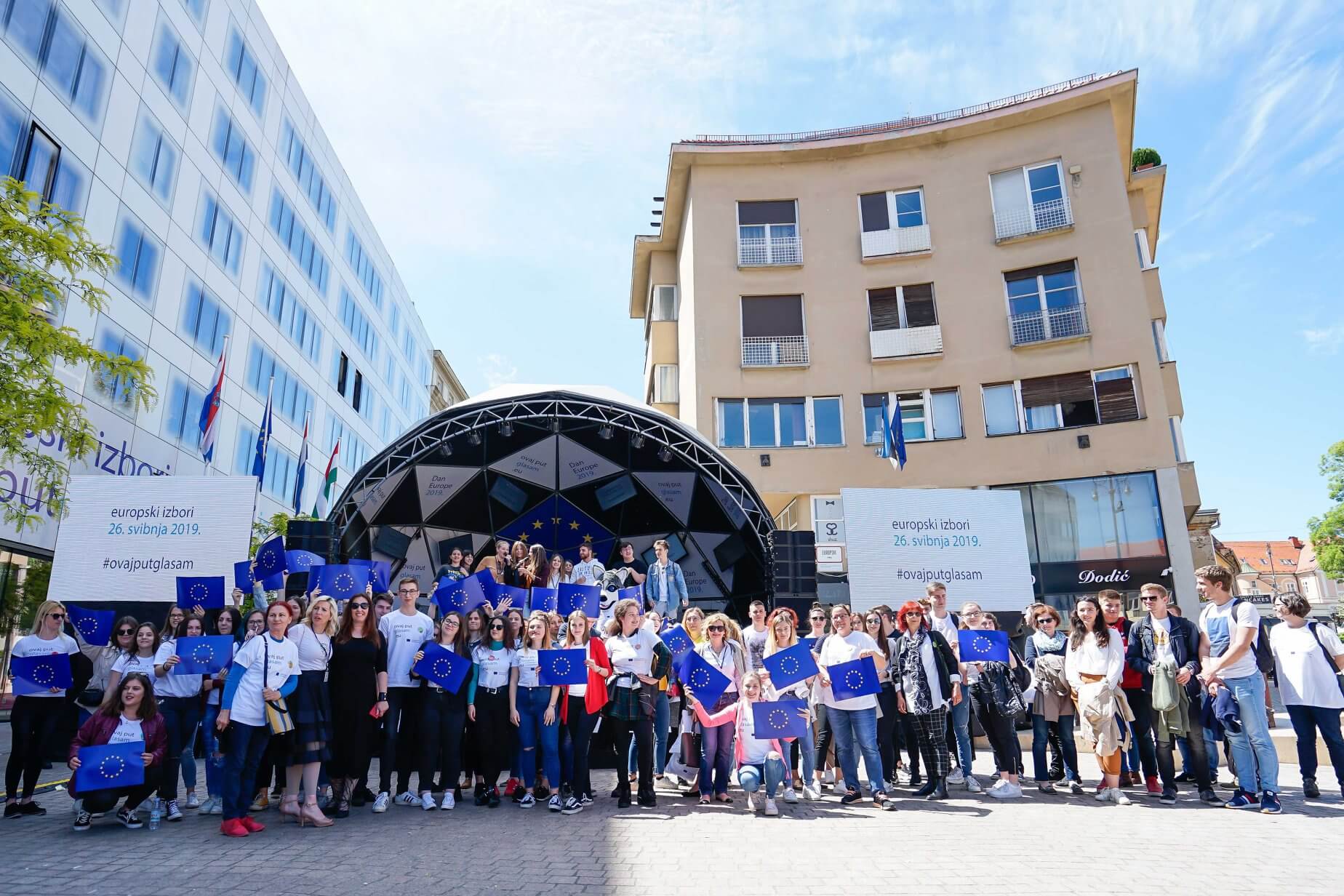
2019 EP elections campaign "This time I vote" © European Parliament Office in Zagreb
The citizens recognize the help the Zagreb EP office can offer, and the Office gets lots of inquiries daily. Over time, the phone calls were more often replaced by e-mails, and first contacts are often made through the Office's social networks. 45,000 followers on Facebook and heavy engagements on Twitter and Instagram, and the quick response of the small staff are certainly admirable.
„We sometimes receive the bulk of documents as many people send us copies of their dealings with various institutions or judicial bodies. These types of problems are, of course, beyond our remit, but we will always try to help people to identify the right authority they need to address and contact in order to resolve their issues. We also get requests from various researchers and scholars who need help with finding certain data and material important for their work, or who need background information on a certain topic“, said Simeonova Staničić, adding the questions they receive are quite diverse.
The central part of the Office’s daily work revolves around 12 Croatian members of the Parliament. “Working with Croatian members of European Parliament is our daily priority and what we center our work around. We organise press conferences and events around issues they work on and committees that they are members of. We cooperate and communicate with them very successfully, as we foster a mutually beneficial relationship with them. As a rule of a thumb, we virtually have no event without a member of European Parliament present“, Simeonova Staničić explains.
The other part of the Office's role includes working with youth, media, and NGOs.
When it comes to the media, the Office informs daily about ongoing debates and discussions concerning the day-to-day activities of the European Parliament. They also strive to put important decisions in context and promote and explain the work of members of the Parliament. Before the coronavirus pandemic, the Office even invited journalists to follow the plenary sessions in Strasbourg to give them the opportunity to familiarise themselves better with the institution and its role in the EU decision-making process. In return, a steady community of journalists following EU affairs is formed in Croatia, and the expansion of reporters is something the Office always welcomes. The accent is put on working with local media, and several outlets managed to get co-finance for their projects by European grants.
Cooperation with NGOs depends on every project and topic of interest, but with the diversity of NGOs, some sort of collaboration with some organisation is always ongoing.
Regarding the youth, two projects stand out. „Our two most successful projects to date are Euroscola and European Parliament Ambassador School Programme (EPAS). Euroscola became so popular among all Croatian schools that whenever we had rounds of regional or national selections, we had over 100 schools competing for very limited quota to go to Strasbourg for a day at the European Parliament. Through Euroscola, we created a fantastic network of incredibly involved, active, hard-working schools all over Croatia. The EPAS program was launched in 2016, and today we have a wide network of over 50 high schools scattered across the country. They cooperate closely with us and follow the work of Croatian MEPs throughout the entire school year“, pointed out Simeonova Staničić.
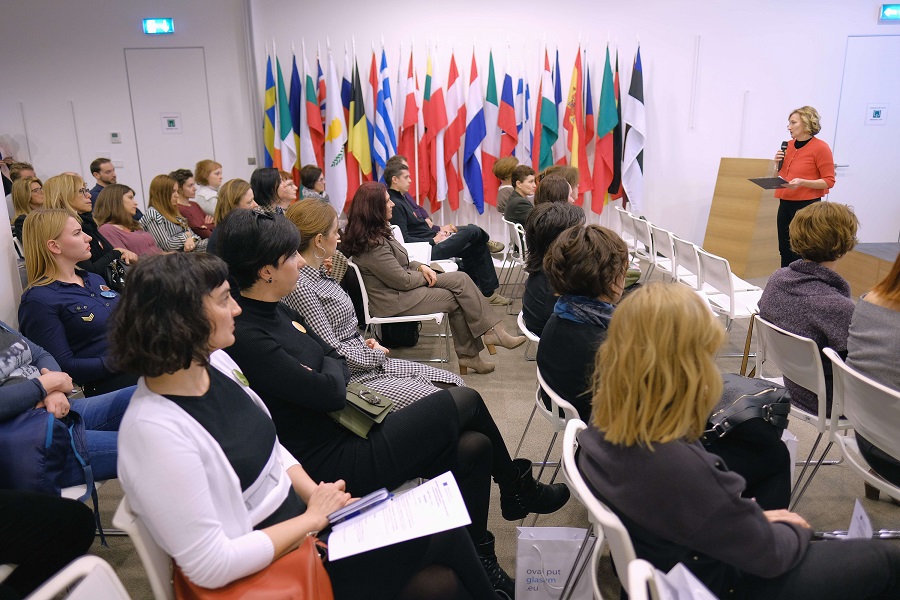
Senior EP Ambassadors © European Parliament Office in Zagreb
Apart from media and citizens, the cooperation with the official bodies of the state is at a high level too.
„We collaborate very well with the Ministry of Foreign Affairs and other government institutions. For example, we cooperate when the delegation of the European Parliament comes to Croatia to work on a certain topic related to the upcoming legislation. This cooperation was particularly pronounced in the run-up to and during the first Croatian presidency of the Council of the European Union“, said Simeonova Staničić.
Particularly good collaboration is also made with the Croatian Parliament, a natural counterpart of the European Parliament. Currently, they are organizing the conference on the future of Europe, but also a more regular public award ceremony for the European Citizens’ Prize (established in 2008 by the EP to award individuals or groups that contributed to empowering European Integration).
„We are also regularly in contact with foreign embassies in Croatia, in pre-Covid times they were not only guests at our events, but also provided interesting speakers from their own countries for our panels and conferences “, described Simeonova Staničić the vast web of cooperation the Office has in Croatia.
Although being an Office for the European Parliament, they also help citizens by giving information on other EU institutions and how to get in touch with them. Informing citizens of ways to actively take part in European democracy, Simeonova Staničić describes as „the core of everything we do as an office of the most democratic institution of the EU“.
„European citizens can petition the European Parliament through our dedicated portal (European's Citizens's Initiative). This is a very transparent process whereby individuals or associations can submit a petition on a subject which comes within the European Union’s fields of activity and which affects them directly “, she explained.
Croatian perception and EU scepticism.
Perhaps it depends on the algorithm or just the loudness of its spokespersons, but it seems Euroscepticism is on the rise in Croatia. Still, Simeonova Staničić's view is much more optimistic and based on the public opinion surveys.
„Actually, the latest Eurobarometer survey shows that 78% of participants in Croatia state that EU membership is beneficial to Croatia, and 74% of those asked believe that COVID-19 economic recovery will be faster thanks to the EU. The majority of the respondents also answered that they have a positive image of the EU“, she said. She continued, however, that almost similar in size is the number of people who have neither negative nor positive opinions.
„For us, these 'non-committal' ones are really important and we try to reach them with our work. We need to raise their awareness about the advantages of the EU; thus, we mainly address young people, who are natural citizens of the EU, who are so accustomed to all the freedoms and opportunities the EU gave them that they take them for granted. They are not aware that there was a time, not so long ago, when these opportunities did not exist“, explained the Head of Office headmistress.
She added that entrepreneurs, managers, and small and medium business owners are most aware of EU benefits, making them natural partners and ambassadors with whom the Office also works really well.
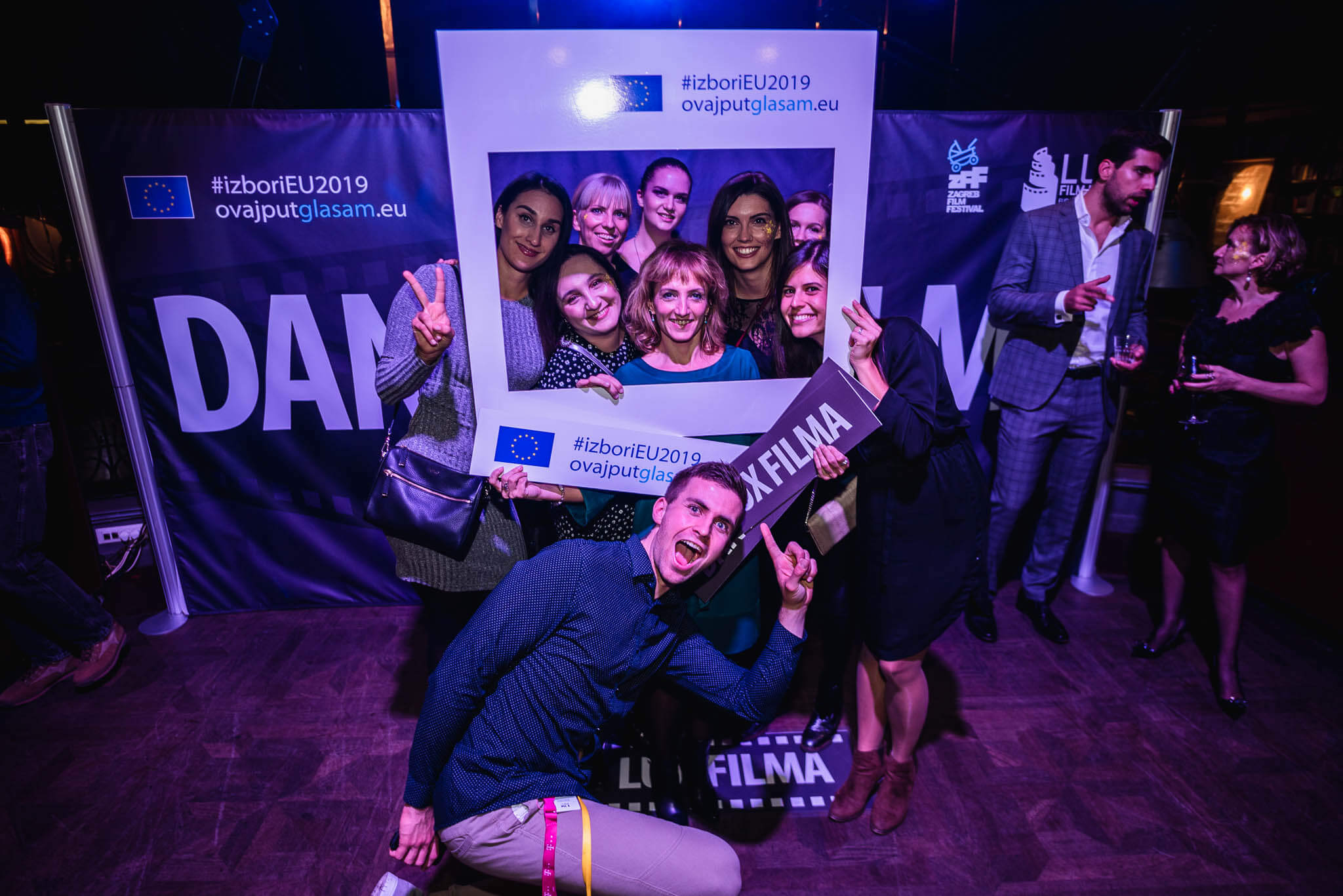
Lux Party on election year © European Parliament Office in Zagreb
In similar rhetoric, Simenonova Staničić dismissed my thesis that young people recognize the easier traveling and working in other member countries as the only benefits of the EU. Firstly pointing out that „freedom of movement, freedom of choice, and the privilege to be employed without administrative barriers in any member state is one of the biggest values and benefits coming from an EU membership“, which means „escaping Croatia is not the right terminology“. Also, just as Croatians are leaving the country, other countries experience the same thing as their citizens are coming to Croatia.
„Due to the pandemic, we are actually witnessing more EU nationals temporarily moving to Croatia, as they work remotely. There is a large community of EU nationals which continues to grow, and it has a lot to thank Croatia’s EU membership“, argued Simeona Staničić.
Indeed, the reputation, and trust in the global community secured by EU membership, certainly contributed to the rise of digital nomads coming to Croatia, on which TCN regularly reports.
The Head of Office once again repeated how most of the benefits in EU Croatians regularly experience and are enjoyed without realizing it is thanks to the EU.
„When there is a new school lab or student housing being built with European funds, or when our young people go off to university or college and take for granted that they would go on an Erasmus exchange; when they don’t have to pay major tuition fees while studying abroad in some other EU member state but are charged the same rate as locals; when, together with other European countries like France, Belgium, and Germany, your government is part of negotiations on major questions of international importance: from health to peace and security...“, she listed various examples.
When asked to comment on Croatia's respect for human rights and European values, a question inspired by last year's cases the Republic of Croatia lost in the European Court of Human rights in Strasbourg, Siemonova Staničić refused to comment and instead explained that the role of the Office in Zagreb (as well as anywhere in Europe for that matter) is not political.
„We are here to provide support to members of the European Parliament in the exercise of their official mandate on the hand and to ensure that people understand actions of the Parliament and to encourage them to engage in the European democratic process on the other. This is important because citizens have tools to influence the legislative agenda of the EU directly “, explained Simeonova Staničić. For the already mentioned European Citizens Initiative, the EP must consider proposals with 1 million verified signatures.
Zagreb office for every EU citizen: Speaking English, Croatian, and six more languages!
As the EU is dedicated to being beneficial for every EU citizen from every country in the organization, so is the EP Office in Zagreb. Simeonova Staničić says the Office serves every EU citizen in Croatia, and whether - in person or online, they will address any issue or interest non-Croatian EU citizens may have and gladly respond and engage.
„In general, we work in the language of our host, which in this case is Croatian. Nevertheless, every European official is obliged to pass the employment exams in one of the working languages of the European Union and within two years to be able to work in 3 languages. In our case, our Office uses predominantly Croatian and English, but I am proud to say that my colleagues are proficient in many languages, and we can serve European citizens also in French, German, Slovenian, Bulgarian, Dutch, and Italian, without hesitation“, assured Simeonova Staničić.
The same service is also offered to Croatians in other EU countries, as every member state has an EP office. And cooperation being the keyword, the offices are frequently in touch as well.
"For example, the Parliament organized an online solidarity event called #EPASwithPetrinja where pupils from three member states (France, Ireland, and Spain) engaged with their counterparts from Petrinja and Zagreb to express solidarity in the wake of the disastrous earthquake that hit parts of Croatia and to comfort children their age from those hard-hit areas. At the event, we had members of the European Parliament from France, Ireland, and Croatia as speakers,“ Simeonova Staničić gave one example, adding that the cooperation is also there whenever there is a common topic or members of the European Parliament from different delegations work on major legislative or policy issues of interest to European citizens across the Union.

EPAS with Petrinja © European Parliament Office in Zagreb
The EP offices are always located in the capital city, and several countries also have the so-called „Antenna offices“ located in other larger cities such as Germany (Munich), France (Marseille), Poland (Wroclaw), Spain (Barcelona), and Italy (Milan).
„We do not have offices around the country. However, both our Office and the Representation of the European Commission in Croatia use the network of the so-called Europe Direct Information Centres. There are 10 of them in Croatia currently, and they are located in Petrinja, Slavonski Brod, Čakovec, Šibenik, Zadar, Osijek, Virovitica, Split, Pula, and Karlovac. They are not under our authority - we do not control them, and they are not a part of our structure. But they are our natural partners in various activities and often serve as local contact points“, explained Simeonova Staničić.
To conclude, the European Parliament Office in Zagreb is open to assist anyone that wants to receive any information related to the European Parliament - be it regarding its debates, ongoing plenaries, committee meetings, work of the members of the European Parliament, or general information concerning other European institutions.
The address of the Office is Augusta Cesarca 4 in the House of Europe on European Square in Zagreb, which is open from 9 am to 5 pm (however, due to the pandemic, the office is closed to the public until further notice). At that same time, you can reach them on the general E-mail This email address is being protected from spambots. You need JavaScript enabled to view it. or on the following phone numbers:
For public relations (citizen inquires):
Violeta Simeonova Staničić (Office head): + 385 1 4880 280 (E-mail: This email address is being protected from spambots. You need JavaScript enabled to view it.)
Janja Mateja Aleš (assistant): +385 1 4880 269 (This email address is being protected from spambots. You need JavaScript enabled to view it.)
Andrea Čović Vidović: +385 1 4880 273 or +385 91 510 6830 (E-mail: This email address is being protected from spambots. You need JavaScript enabled to view it.)
Marko Boko: +385 1 4880 274 (E-mail: This email address is being protected from spambots. You need JavaScript enabled to view it.)
For media relations:
Maja Ljubić Kutnjak: +385 1 4880 272 or + 385 99 490 4715 (This email address is being protected from spambots. You need JavaScript enabled to view it.)
Barbara Peranić: +385 1 4880 272 or + 385 99 271 3026 (This email address is being protected from spambots. You need JavaScript enabled to view it.)
You can also follow the Office on Facebook, Twitter, Instagram, Youtube, and Flickr.
For any changes with the address, contacts, etc., check their official website.
To read more from the series "Friends of Croatia", follow TCN's dedicated page.
For more about European Union in Croatia, follow TCN's dedicated page
Friends of Croatia: Basic Terms of Diplomacy
April 29, 2021 - The second article in the series "Friends of Croatia" covering all things diplomatic, looks into an overview of the basic terms of diplomacy both for a more accessible following of the series,as well as for safer travel and for being more informed in general.
When exploring Croatian diplomatic relations, terms such as diplomats, embassies, ambassadors, and consulates are the keywords of the topic. Diplomacy is important of course for countries to communicate, express and arrange mutual cooperation, push their respective interests, and offer help to their citizens in another country. But, what is for what and who is for who?
The embassy is for everything, the consuls are for more minor details
As Postoffice.uk points out, to a fellow traveller these questions may not be of too much importance, but having a bit of trivia knowledge never hurts.
''An embassy is the base for a country’s diplomatic mission abroad – meaning all of the political, cultural and social relationships between the two countries. There will only be one embassy for one nation in another country, as it is where the country’s ambassador works (and sometimes resides). A consulate is where consular services are performed. Embassies will normally have a consular section. While there will be only one British Embassy in the country you visit, there may be a number of consulates. These would usually be in cities with the most tourists,'' writes Postoffice.uk.
It's worth noting that while the aforementioned explanation is written from the British perspective, this difference is appliable to any country.
The Thought.com page illustrates that very well, explaining the difference in the case of the United States of America.
''An embassy is responsible for representing the home country, for handling major diplomatic issues (such as negotiations), and for preserving the rights of its citizens abroad. Consulates (and their chief diplomat, the consul) handle minor diplomatic issues such as issuing visas, aiding in trade relationships, and taking care of migrants, tourists, and expatriates,'' writes Thought.com. The site adds that usually when a country recognises another as being sovereign, an embassy is established to maintain foreign relations and provide assistance to travelling citizens.
Embassies and consulates can help a person out with many things. For instance, if you lose your passport, the diplomatic representatives can acquire you a new one. If you get sick, they can offer you the contacts of local doctors or lawyers in case you're the victim of a crime.
They can't offer you healthcare which is of a different level than the one there is in the country already, nor can they lead any sort of investigation themselves; they can't even pay you money or offer remuneration, but the contacts they can provide as well as the advice they can give can help you tremendously when coming unstuck in a foreign country.
This is why its important to be informed where the embassies or consuls of your country are located in the country you're visiting. But, don't expected them to help you if you end up in trouble with the law in another country yourself, as they can't interfere in those legal processes in respect of other nation's sovereignty. Despite that, they can give you lists of lawyers and guides to the legal process in the country you're visiting, visit you if you're arrested, and maintain contact with your family to inform them of what happened. While you hopefully won't end up in a dire situation it is still better to travel while being as informed as possible. Usually, a bit of common sense and decency will let you avoid such incidents.
Your country is a host to the embassies of other countries too, and you can visit them if you want to travel to another country to check your visa requirements. Keep in mind that in embassies, the country where the embassy is located doesn't have jurisdiction in the embassy, and you can be arrested in the embassy by security forces or ask for protection to avoid arrest from the forces of the country the embassy is in. The ever-controversial Julian Assange finding refuge in the Ecuadorian embassy in London to avoid arrest is perhaps the best-known example of this, and he was arrested by the British police only after negotiations with Ecuador were conducted.

pixabay
Ambassador and diplomat: the same job, but the ambassador is the boss
Similar to all toes are fingers, but not all fingers are toes – the ambassador is the highest-ranked of all diplomats in the embassy.
''The ambassador is the highest official in the embassy and acts as the chief diplomat and spokesperson for that embassy's home government. Ambassadors are typically appointed by the highest level of the home government. In the United States, ambassadors are appointed by the president and confirmed by the Senate'' writes Thought.com.
As Wikidiff compares it, the ambassador is ''a minister of the highest rank sent to a foreign court to represent his sovereign or country there. (Sometimes called ambassador-in-residence )'' or ''an official messenger and representative''. A diplomat, in essence, is, as Wikidiff continues: ''A person who is accredited, such as an ambassador, to officially represent a government in its relations with other governments or international organisations.''
Marc Finaud, the Head of Arms Proliferation at Geneva Centre for Security Policy (an international foundation for promoting the building and maintenance of peace, security, and stability), writes that diplomats have five main tasks in accordance with the international Vienna Convention on Diplomatic Relations from 1961. ''Representation, protection of national interests, negotiations, reporting, and the promotion of friendly relations. Such skills can also be of interest for non-diplomats engaged in professional activities involving contacts with foreign people or cultures,'' writes Marc Finaud for GCSP.
Diplomacy is interesting, challenging, and above all, an important profession, and much more can be written about it than just this text. Still, these are the basic facts of diplomacy to follow in this series and to arrange safer and more informed travel abroad.
To read more from the series "Friends of Croatia", follow TCN's dedicated page.
For more about politics in Croatia, follow TCN's dedicated page.
Friends of Croatia: New TCN Series On All Things Diplomatic
April 20, 2021 - Check out the newest TCN series "Friends of Croatia", dealing with all things diplomatic, by TCN reporter Ivor Kruljac
December 22, 1990, the Croatian parliament known as Sabor brought its first independent constitution, known as „The Christmas Constitution“. After that, the same parliament officially declared Croatia as an independent country and no longer part of the Socialist Federal Republic of Yugoslavia on June 25, 1991. Then followed the Ex-Yu War known in Croatia as a Homeland War, which lasted until 1995.
While this war is one of the foundations of Croatian independence, noted by the modern constitution as well as on other grounds of historic events, the dedication of soldiers, tactics, weapons, force and combat skills weren't the only cards Croatia had to achieve its sovereignty. It was also the communication with the international community and international recognition. This allowed Croatian citizens to not end up in the trap of Transnistria, a sovereign state officially recognized as part of Moldova, where Moldova does not rule due to the army and force monopoly by the Transnistrian government, but whose passports have no benefit for its citizens and despite being a state, in official maps does not exist.
Iceland was the first sovereign country to recognize Croatia as a sovereign state on December 19, 1991, followed by Germany in whose recognition took effect on January 15, 1992. Slovenia technically did recognise Croatia first, the same as Croatia was the first to recognise Slovenia, but neither country had international recognition at the time, which is the reason Iceland counts first. Floored by Iceland and Germany, other countries started to recognize Croatia and the new-found Republic joined the UN on May 22, 1992. The international status was then additionally boosted with joining Nato on April 1, 2009, and the EU on July 1, 2013.
Today, Croatia has 176 diplomatic relations; and for TCN writers, reporting on diplomacy is nothing new. Diplomatic relations can be viewed, in layman terms, like friendships, and this is why this series is called „Friends of Croatia“. As stated by the E-International relations site, diplomacy has existed as long as the human race. It can be viewed in the first negotiations amongst individuals before graduating to the level we know today.
„Among the many functions of diplomacy, some include preventing war and violence and fortifying relations between two nations. Diplomacy is most importantly used to complete a specific agenda. Therefore without diplomacy, much of the world’s affairs would be abolished, international organizations would not exist, and above all, the world would be in a constant state of war. It is for diplomacy that certain countries can exist in harmony“, writes the E-International relations site.
And indeed, shutting down diplomatic relations is a final step before potential war escalation and the spread of violence. Even with certain diplomatic tensions, Croatia has with Slovenia around Piranski Bay, or with Serbia regarding uncleared questions from the Homeland War, the fact there are diplomatic relations both with Serbia and Slovenia ensures that these tensions can be solved by peace and not violence.
But what exactly are the details of Croatian diplomatic relations with other countries and international organizations? This is precisely what this series strives to bring by explaining the history of Croatian diplomatic relations by talking to diplomats, embassies, and representers of international communities, with an informative, unique approach to each specific relation. The series wants to inform of the ups and downs of Croatian international collaboration, how to make them better, what benefits are there in these relations for Croatia, and what benefits are there for other countries. Keep your eyes open for articles in these series with more details and interesting facts about diplomacy in general too.
If you are working in the embassy or in an international organization in Croatia, feel free to reach out to This email address is being protected from spambots. You need JavaScript enabled to view it..
To read more from the series "Friends of Croatia", follow TCN's dedicated page.
For more about politics in Croatia, follow TCN's dedicated page.


